BY MICHELLE ALDEN
Jerry and Sherri Alexander have gener ously come forward to support this year’s Equal Access to Justice Campaign with an outstand ing contribution of $25,500. The Alexan ders have a long and distinguished history of contributing to the Campaign. Including this gift, they have donated more than $214,000 to legal aid for low-income people in Dallas since 2006. The Equal Access to Justice Cam paign is the annual fundraising campaign that supports the activities of the Dallas Volunteer Attorney Program (DVAP).
Jerry Alexander practices complex busi ness litigation at Passman & Jones, served as the 107th President of the Dallas Bar Asso ciation, was Chair of the Board of the State Bar of Texas in 2019-2020, and presently is a candidate for President-Elect of the State Bar of Texas. Sherri Alexander serves as Chair of the Health Care Litigation practice at Polsi nelli. Together, the Alexanders believe in sup porting and benefiting the Dallas community. They know that their contributions to DVAP benefit the Dallas community in many ways.
This year, Jerry would like to highlight the people working behind the scenes.
“DVAP is difficult to execute. Think about it. Attorneys must be encouraged to volun teer, then matched up with a qualified client in need and the services monitored and ren dered successfully, and funds need to be raised yearly to keep it going. But, in many ways, it is the most important thing we do. Michelle Alden and Alicia Hernandez, before her, have done a splendid job of making all this happen. But beyond Michelle and Alicia, here is a listing of the people who also deserve the credit. They work day in and day out, just like the courts: Holly Griffin (Managing Attorney), Kristen Salas (Mentor Attorney), Katherine Saldana (Mentor Attorney), Carolyn Johnson (Paralegal), Charnese Garrett (Legal Secretary), Andrew Musquiz (Parale gal), Whitney Breheny (Referral Paralegal), Alicia Perkins (Paralegal), Miriam Caporal
(Paralegal), Susan Matthews (Paralegal), Tina Douglas (Paralegal), Laci Payton (Pro gram Assistant), and Marisela Martin (Community Engagement Coordinator). Sherri and I sincerely thank these dedicated staff who are such an integral part of the program!”
The DVAP staff have seen the number of people seeking help rise substantially this year. Low-income residents of Dallas have faced many additional challenges during the pandemic and urgently need legal assistance. Sole practitioner Jaha Thomas helped Rita, one recent applicant.
According to Jaha, “I represented an upstanding citizen who was down on her luck. She faced eviction as an employee who was paid hourly and caught Covid twice. Her employer did not provide sick leave and required employees to quarantine if they were exposed to Covid. She did everything she could to pay her rent, but due to her illness and the employer’s quarantine rules, she was stuck. We had three hearings. The first two were continued, but in the third hearing, Rita received an abatement of 60 days, which was just enough time for her to get a new job and move to a different apartment. The joy and gratitude in her voice helped me understand DVAP’s mantra ‘billable hours for your soul.’”
Rita’s story shows what a profound differ ence a few hours of a pro bono attorney’s time can make in a DVAP client’s life. In addition to wonderful volunteers like Jaha, the reality is, helping people like Rita requires financial support too.
As Sherri stated, “A little legal guidance at the right time is sometimes the difference that prevents someone from becoming home less. Attorneys should contribute, if they can, but should always remember they can con tribute their time, and that ‘office work’ is just as important as ‘courthouse work’ in helping those who cannot afford an attorney.”
Jerry emphasizes the importance of access to the civil court system for all: “It is the place where citizens go to resolve their dis putes, and without it, people would be forced
to take matters into their own hands. Our society works because people do not do so, but instead find a lawyer to address their dis putes in court. Everyone must be given access to the system--otherwise, societies and even entire civilizations can fall if enough citizens are denied access. The Equal Access to Justice Campaign is there to prevent that—it facili tates access to the civil courts for people who really need help and truly cannot afford an attorney. For such citizens to have their day in court is the goal. No one feels as if they were turned away—the courts are for everyone, and
the outcome is sometimes not as important as simply not being excluded.”
“Contributing to DVAP is something we have done for years and hopefully can con tinue. It simply feels like the right thing for us, as lawyers, to do,” said Sherri.
DVAP is a joint pro bono program of the DBA and Legal Aid of NorthWest Texas. For more information, or to donate, visit www. dallasvolunteerattorneyprogram.org. HN
Michelle Alden is the Director of the Dallas Volunteer Attorney Program. She can be reached at aldenm@lanwt.org.
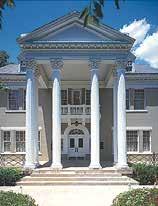
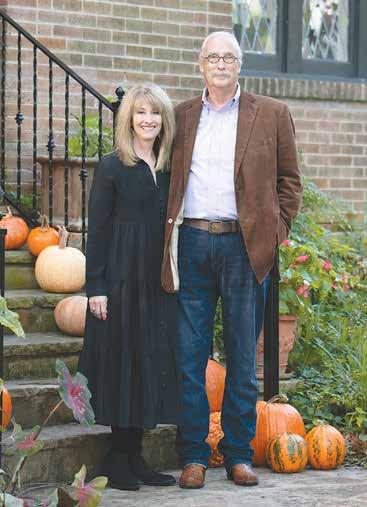
Focus | Probate, Trusts & Estates/Tax Law HEADNOTES Dallas Bar Association HEADNOTES 8 Options for Correcting Mistakes and Omissions on Tax Returns 14 What About Fido!? Planning for Pets Upon Incapacity or Death 25 John Goren Receives Kim Askew Distinguished Service Award 32 Pro Bono Attorney & Firm of the Year 37 The Reach out and Pluck Statute Inside December 2022 |Volume 47 |Number 12 DBA MEMBER REMINDER – RENEW ONLINE NOW You may renew your 2023 DBA Dues now! Go to dallasbar.org and click on the My DBA button to log in and Renew online. Your 2023 DBA DUES must be paid by December 31, 2022 in order to continue receiving ALL your member benefits. Thank you for your support of the Dallas Bar Association!
and
Jerry
Sherri Alexander Support DVAP
$900,000
$1.4 Million $50,0000 $250,000 $350,000 $500,000 $700,000 $200,000 $300,000 $400,000 $600,000 $800,000 $150,000 To Give: www.dvapcampaign.org.
G O L D P A T R O N Capital One Margaret & Jaime Spellings D I A M O N D S P O N S O R S Anonymous Foundation Gibson Dunn & Crutcher LLP Haynes and Boone Foundation Nexstar Charitable Foundation Vistra Corp. P L A T I N U M S P O N S O R S Akin Gump Strauss Hauer & Feld LLP AT&T Business Litigation Section Condon Tobin Sladek Thornton Nerenberg PLLC Covington & Burling LLP Jackson Lewis Foundation Jackson Walker LLP Latham & Watkins LLP Munsch Hardt Kopf & Harr, P.C. Rosewood Foundation Vinson & Elkins LLP *As of November 14, 2022 C H A I R M A N ’ S C O U N C I L Jerry & Sherri Alexander Kirkland & Ellis LLP Morrison Foerster Sidley Austin Foundation Toyota Motor North America/ Toyota Financial Services P R E S I D E N T ’ S C O U N C I L Hartline Barger LLP T hank You to Our Major Donor s
Sherri & Jerry Alexander
THURSDAY, DECEMBER 1
FRIDAY, DECEMBER 2
MONDAY, DECEMBER 5
Tort & Insurance Practice Section
“Winning at Persuasion for Lawyers,” Shane Read. (MCLE 1.00)* In person only
5:00 p.m. Appellate Law Section Topic Not Yet Available (MCLE 1.00)* In person only
WEDNESDAY, DECEMBER 7
Noon Employee Benefits & Executive
Compensation Law Section
“Executive Compensation Trends in the Energy Sector,” James Deets and Dylan Hernandez. (MCLE 1.00)* Virtual only
Solo & Small Firm Section
“Bullying in the Legal Profession: How to Recognize, React, and Remedy,” Mike Bassett, Amy M. Stewart, and moderator Scott Solley. (Ethics 1.00)*
Child Welfare & Juvenile Justice Committee. Virtual only


4:00 p.m. LegalLine E-Clinic. Volunteers needed. Contact mmejia@dallasbar.org.

TUESDAY, DECEMBER 6
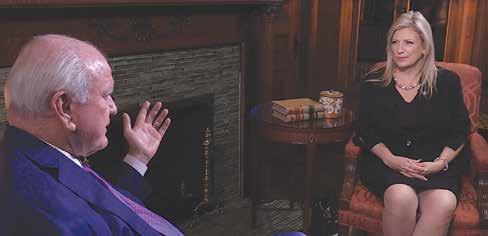
THURSDAY, DECEMBER 8
Noon Legal Ethics Committee CLE
“End of the Year Roundup,” Jerry Hall, Prof. Fred Moss, and Ken Rubenstein. (Ethics 1.00)*
Christian Lawyers Fellowship. In person only DAYL Fellows Luncheon. Visit dayl.com for more information.
7:00 p.m. Dallas LGBT Bar Association Gala For more information, visit dlgbtba.org
FRIDAY, DECEMBER 9
Noon Friday Clinic
“Lawyer Mental Health and Challenges and Strategies for the Holidays,” Michelle Fontenot and John McShane. (Ethics 1.00)* Presented by the CLE & Peer Assistance Committees. Virtual only
Government Law Section Topic Not Yet Available
Trial Skills Section
“Taking and Defending Depositions for Use at Trial,” Chandler Rognes, Natali Wyson, and Angela Zambrano. (MCLE 1.00)* In person only
MONDAY, DECEMBER 12
Noon Real Property Law Section
“Environmental Considerations for Real Estate Lawyers,” Timothy Wilkins. (MCLE 1.00)* Virtual only
DVAP CLE “Small Estate Affidavits,” Hon. Lincoln Monroe. (MCLE 1.00)* In person only
Peer Assistance Committee. In person only
6:00 p.m. DBA Holiday Party Enjoy pictures with Santa, face-painting, balloon animals, sing-alongs and more! Please bring an unwrapped toy to be donated to charity. For more information, contact yhinojos@dallasbar.org.
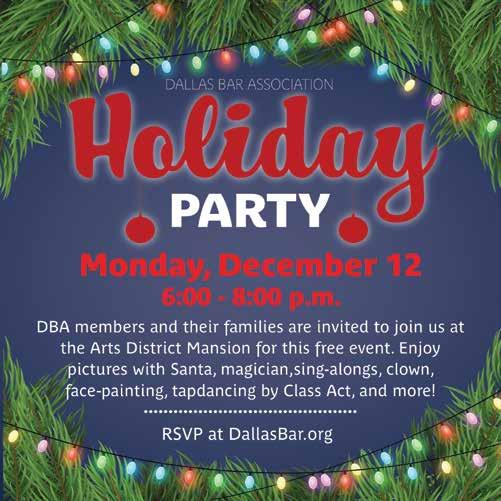
TUESDAY, DECEMBER 13
Noon Business Litigation Section
“Trying Cases in Today’s Cultural Landscape,” Robert Hirschhorn, Brian Lauten, Dick Sayles and moderator Michael Lyons. (MCLE 1.00)* In person only
Immigration Law Section Topic Not Yet Available
Mergers & Acquisitions Section
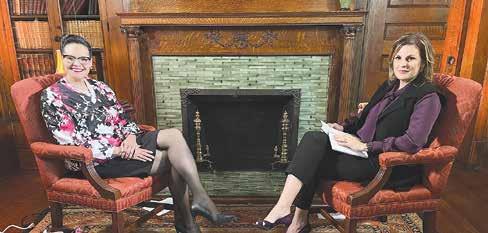
“Underestimate the Indemnification Section at Your Peril,” Candace Groth and Vela Wood. (MCLE 1.00)* Virtual only
WEDNESDAY, DECEMBER
THURSDAY, DECEMBER
FRIDAY, DECEMBER
Intellectual Property Law Section
Ethics Issues for IP Lawyers,” David
Virtual only
Virtual only
& Community
Virtual only
Noon
“Current
Hricik. (Ethics 1.00)*
Judiciary Committee
Law in Schools
Committee.
Santa Brings a Suit Drive Drop Off
the Arts District
or at
firm
Muchin,
Life
9:00 a.m.
Circle Drive at
Mansion, (2101 Ross Ave.),
the
of Katten
Rosenman (2121 N. Pearl St., Ste 1100). Benefiting Dallas
Foundation.
Noon Franchise & Distribution Law Section “Topic Not Yet Available,” Sam Mallick and Wilson Miller. (MCLE 1.00)* Virtual only Tax Law Section “Latest Trends/Topics in Tax-Exempt Entities,” Jonathan Blum. (MCLE 1.00)*. In person only
Noon ABA Practice Forward Program “Where Does the Legal Profession Go from Here?
Home Project Committee. In person only 5:30 p.m. Bankruptcy & Commercial Law Section “Annual Judges’ Roundtable,” Hon. Scott Everett, Hon. Stacey G.C. Jernigan, Hon. Michelle Larson, and Hon. Edward Morris. (MCLE 1.00)* In person only
14
Noon Collaborative Law Section Topic Not Yet Available 4:00 p.m. LegalLine E-Clinic. Volunteers needed. Contact mmejia@dallasbar.org.
Noon
Topic
Publications
only Christian
only 4:00
15
Environmental Law Section
Not Yet Available
Committee. Virtual
Legal Society. In person
p.m. DBA Board of Directors Meeting
16 9:00 a.m. Last day to drop off donations for Sand Branch Food
19 No DBA Events Scheduled TUESDAY, DECEMBER 20 No DBA Events Scheduled WEDNESDAY, DECEMBER 21 No DBA Events Scheduled THURSDAY, DECEMBER 22 No DBA Events Scheduled FRIDAY, DECEMBER 23 DBA offices closed in observance of Christmas holiday MONDAY, DECEMBER 26 DBA offices closed in observance of Christmas holiday TUESDAY, DECEMBER 27 No DBA Events Scheduled WEDNESDAY, DECEMBER 28 No DBA Events Scheduled THURSDAY, DECEMBER 29 No DBA Events Scheduled
DECEMBER 30 DBA offices closed in observance of New Year’s Eve 2 Headnotes l Dallas Bar Association December 2022 Calendar December Events Visit www.dallasbar.org for updates on Friday Clinics and other CLEs. FRIDAY CLINICS DECEMBER 9 Noon “Lawyer Mental Health and Challenges and Strategies for the Holidays,” Michelle Fontenot and John McShane. (Ethics 1.00)* Virtual only. Presented by the CLE & Peer Assistance Committees If special arrangements are required for a person with disabilities to attend a particular seminar, please contact Alicia Hernandez at (214) 220-7401 as soon as possible and no later than two business days before the seminar. All Continuing Legal Education Programs Co-Sponsored by the DALLAS BAR FOUNDATION. *For confirmation of State Bar of Texas MCLE approval, please call the DBA office at (214) 220-7447. **For information on the location of this month’s North Dallas Friday Clinic, contact yhinojos@dallasbar.org. Programs and meetings are presented Virtually, Hybrid, or In-Person. Check the DBA Online Calendar (www.dallasbar.org) for the most up-to-date information. Programs in green are Virtual Only programs. In November, the DBA hosted two Living Legends programs: (top) Donald Godwin interviewed by DBA President Krisi Kastl, and (bottom) Hon. Ada Brown interviewed by Erin Nealy Cox. Find all the Living Legends videos on our YouTube Channel at https://buff.ly/3FwEmN3. DBA Living Legends we have your ct information. NG OUR EMAILS? Log in to your "My DBA Page," and click ‘Update Profile’ or email membership@dallasbar.org. WWW.DALLASBAR.ORG
Drive MONDAY, DECEMBER
FRIDAY,

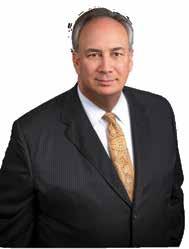
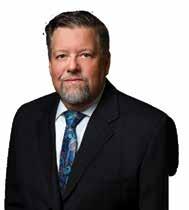
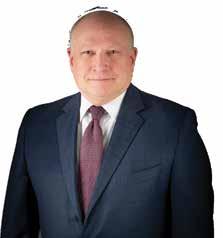

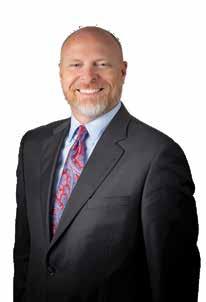
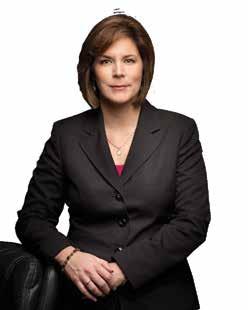
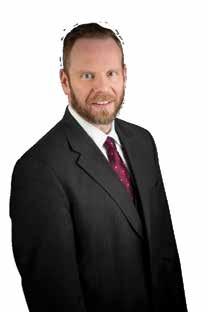
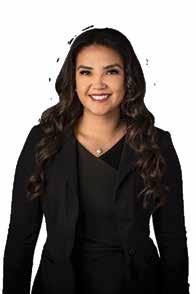
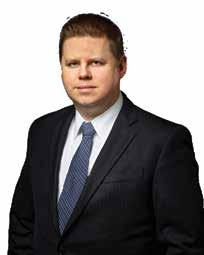
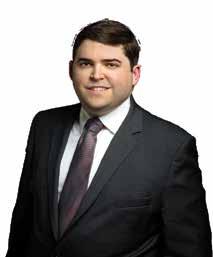
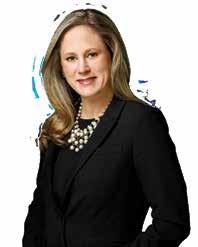
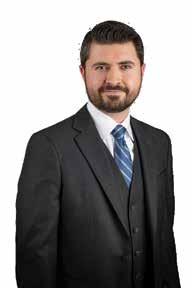

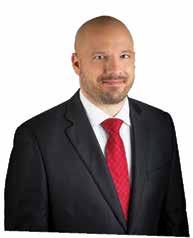
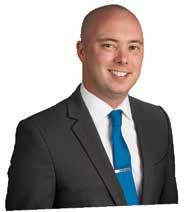
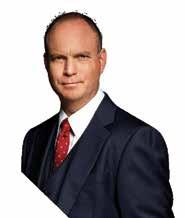
December 2022 Dallas Bar Association l Headnotes 3
President’s
Goodbyes, Gratitude, and Growth
BY KRISI KASTL
You may forget what I said and did but I hope you do not forget the way I made you feel. My wish is that you felt wel come, appreciated, and engaged.
The DBA’s mission statement “To serve and support the legal profession in Dallas and to promote good relations among lawyers, the judiciary, and the community,” rests on the foundation of people. The people of our organization are what stand out as I look back on the many accomplish ments, challenges, and joys of our year together.
The Dallas Bar Association has a superstar Executive Director in Alicia Hernandez. Alicia embodies the DBA’s mission of putting people first. She has a heart for service and is an advocate for justice. She has the valuable skill of establishing value by fostering connection and respect among everyone she meets. Alicia accommodates diverse organizational needs, yet knows when to maintain healthy boundaries. I am struck by her calming ability that culti vates trust and deep-seated care.
Before coming to the DBA Alicia was an experienced non-profit leader who received her law degree from the University of Notre Dame in 1992. She worked as an attorney for the Legal Services of North Texas and as Assistant Regional Council for the U.S. Department of Health and Human Services. Her areas of practice included Non-Profits and Public Service. Before becoming Executive Director of the DBA in 2017, Alicia was the former director of the Dal las Volunteer Attorney Program, the Community Services, and the Lawyer Referral Service. We are so lucky to have Alicia as our Executive Director.
Every January a big deal is made of the incoming Presi dent of the Dallas Bar, but let’s be clear—the DBA Presi dents are merely cogs in a well-oiled machine. Although the Presidency is in the limelight, the exceptional DBA team members are a big part of the reason the DBA is a nationally recognized bar association.
What, Like It’s Hard?
In 2001 the film Legally Blond created a feminist hero ahead of her time in Elle Woods. The often-quoted line was the protagonist’s response to her boyfriend’s shock that she got into Harvard. The message of the movie was impact ful; You don’t have to change who you are to be successful. Twenty-one years later, the empowering lessons of indepen dence and integrity still inspire me. Rebounding from preconceived notions is what we strive for in the courtroom and beyond. Despite the hundreds of phone calls, the neverending number of emails, numerous Zooms, the countless appearances, and the deadlines that often competed with my lawyer deadlines, being DBA President is the best job that I have ever had. The interactions I had with the many people in our community contributed to a sense of ease that comes with the synchronicity of purpose. The DBA and our affinity bars celebrate the diverse path that has brought us together under one mission of service.
I chose to highlight the past women Presidents of the DBA in my Headnotes columns to celebrate empowering women. It is hard to fathom that there have been only 10 female Presidents since 1985, but we have come a long way and continue to progress. Cheryl Camin Murray will lead the DBA into its 150th year in 2023. In 2025 Vicki Blanton is in line to be President and Sarah Rogers is right after her in 2026. I have always been about women helping women and I will never forget how Cheryl encouraged me. In the Fall of 2006, Cheryl encouraged me to run for the DAYL board. I lost that race, but I didn’t give up. I won the next race for Collin County Young Lawyers Association in 2007 and then the DAYL in 2008.
The Honor of My Life
It has been the honor of my life to serve as your Presi dent. I am so grateful for the opportunity to connect with members of the bar, the community, and the judiciary and to share the passion that I have for the DBA. I am grateful for the powerful bonds forged through acts of service, educa tion, and celebration. I value the hard-working staff of the DBA. Thank you for your encouragement, professionalism, sincerity, and friendship. Thank you to the affinity bars and members for being a living example of our institution’s mis sion.
I cannot fully express my gratitude to the many people who have helped me along this path. I met lifelong friends in the 2006 DAYL leadership class that would encourage and inspire me. Thank you, Cherie Harris , Laura Benitez Geisler , Rob Crain , Jonathan Childers , and Aaron Tobin , among others. There are so many to thank it would take up an entire page, but you know who you are.
The late Karen D. McCloud is the most influential part of my journey. When she was President of the DAYL in 2008, I recall her encouraging me to support one of our DAYL programs, The Ties That Bind, early on a Satur day morning. Karen convinced me to put on my best suit to show up and support Mike Coles as he taught a group of young men how to tie a necktie. She was always lead ing by example. I am sad that she did not get to serve as President of the DBA due to her untimely passing.
Looking Ahead
The holiday season is upon us. Along with the many in-person and online CLEs, the DBA has a lot going on. On December 2, the season of giving opens with the Santa Brings a Suit Dropoff at 9:00 a.m. at the Arts District Man sion, and the DBA Sand Branch Community Food Drive goes through December 16. Let’s celebrate together on December 8 with the DLGBT Bar Association gala, and on December 12, at the DBA Family Holiday Party. For more information check out www.dallasbar.org
Inspired by the People
When all is said and done, my gratitude circles back to the people who make the impossible, possible. In January, I highlighted the importance of connection and charged us to find innovative ways to connect during a pivotal point in our global history. We have succeeded. One of the accomplishments I am most proud of this year is that we were able to amend the bylaws to secure a voting seat for the Dallas LGBT Bar Association. The Arts District Mansion has once again welcomed the people of our community to celebrate and learn. The incredible gathering of people of the DBA will be a cherished memory as President.
Butterflies are a symbol of resurrection and rebirth and often are symbols of those that we have lost too soon. I carry great affection for the symbolism of the butterfly, which sig nifies the power of the transformative process and know ing that wings are on the other side. Karen McCloud knew this too. The DBA will continue to thrive, and I am for ever grateful for my time as President. Like the butterfly, these 12 months seem fleeting when compared to the his tory of our institution. I appreciate the incredible feats we can achieve when we trust ourselves and fly.
From the bottom of my heart, thank you for the honor, opportunity, and the memories. I am glad we were able to get back into the groove in 2022.
Krisi Kastl
Headnotes
Published by: DALLAS BAR ASSOCIATION
2101 Ross Avenue Dallas, Texas 75201 Phone: (214) 220-7400 Fax: (214) 220-7465 Website: www.dallasbar.org Established 1873

The DBA’s purpose is to serve and support the legal profession in Dallas and to promote good relations among lawyers, the judiciary, and the community.

OFFICERS
President: Krisi Kastl
President-Elect: Cheryl Camin Murray
First Vice President: Bill Mateja Second Vice President: Vicki D. Blanton Secretary-Treasurer: Liz Cedillo-Pereira Immediate Past President: Aaron Z. Tobin
Directors: Lauren Black, Rob Cañas, Jonathan Childers (Chair), Stephanie G. Culpepper, Rocio Garcia Espinoza, Hon. Dennise Garcia, Ashlei Gradney (President, J.L. Turner Legal Association), Hon. Martin Hoffman, Andrew Jee, Andy Jones (President, Dallas Association of Young Lawyers), Jennifer King, Jonathan Koh (President, Dallas Asian American Bar Association), Elsa Manzanares (President, Dallas Hispanic Bar Association), Hon. Audrey Moorehead, Timothy Newman, Marisa O’Sullivan (President, Dallas Women Lawyers Association), Kelly Rentzel, Sarah Rogers (Vice Chair), Drew Spaniol, and Amy M. Stewart
Advisory Directors: Alison Ashmore (President-Elect, Dallas Women Lawyers Association), Carla Green (President-Elect, Dallas Hispanic Bar Association), Amber Hamilton Gregg (President-Elect, J.L. Turner Legal Association), Nadia Haghighatian (President, Dallas LGBT Bar Association), Nicole Munoz Huschka (President-Elect, Dallas Association of Young Lawyers), and Janet Smith (President-Elect, Dallas Asian American Bar Association)
Delegates, American Bar Association: Rhonda Hunter, Mark Sales
Directors, State Bar of Texas: Chad Baruch, Mary Scott, Paul Stafford, Robert Tobey, Aaron Z. Tobin
HEADNOTES
Executive Director/Executive Editor: Alicia Hernandez Communications/Media Director & Headnotes Editor: Jessica D. Smith In the News: Judi Smalling Display Advertising: Annette Planey, Jessica Smith
PUBLICATIONS COMMITTEE
Co-Chairs: James Deets and Joshua Smeltzer
Vice-Chairs: Elisaveta (Leiza) Dolghih and Ted Huffman
Members: Logan Adcock, Benjamin Agree, David Brickman, Catherine Bright Haws, Ian Brown, Srinivasan Chakravarthi, Gracen Daniel, Lindsay Drennan, Alexander Farr, Dawn Fowler, Neil Issar, Beth Johnson, Andrew Jones, Alexandra Jones, Krisi Kastl, Jon Kettles, Brian King, Jared Knight, John Koetter, Alan Lightfoot, Margaret Lyle, Derek McKee, Majed Nachawati, D. Mason Parham, Keith Pillers, David Ritter, Carl Roberts, Sarah Rogers, John Shipp, Jared Slade, Sarah Spires, Jay Spring, Sarah-Michelle Stearns, Scott Stolley, Robert Tarleton, Paul Tipton, Anastasia Triantafillis, Pryce Tucker, Kathleen Turton, Peter Vogel, Benton Williams, Jason Winford
DBA & DBF STAFF
Executive Director: Alicia Hernandez
Accounting Assistant: Jessie Smith
Legal Education Coordinator: Viridiana Rodriguez
Communications/Media Director: Jessica D. Smith
Controller: Sherri Evans
Events Director: Rhonda Thornton
Executive Assistant: Elizabeth Hayden
Executive Director, DBF: Elizabeth Philipp
LRS Director: Biridiana Avina
LRS Interviewer: Giovanna Alvarado
LRS Program Assistant: Marcela Mejia
Marketing Coordinator: Mary Ellen Johnson
Membership Director: Shawna Bush
Publications Coordinator: Judi Smalling
Receptionist: Araceli Rodriguez
Staff Assistant: Yedenia Hinojos
Texas High School Mock Trial & Law Related Education Director: Melissa Garcia
DALLAS VOLUNTEER ATTORNEY PROGRAM

Director: Michelle Alden
Managing Attorney: Holly Griffin
Mentor Attorneys: Kristen Salas, Katherine Saldana
Paralegals: Whitney Breheny, Miriam Caporal, Tina Douglas, Carolyn Johnson, Suzanne Matthews, Andrew Musquiz, Alicia Perkins
Community Engagement Coordinator: Marísela Martin
Program Assistant: Laci Payton Secretary: Charnese Garrett
Copyright Dallas Bar Association 2022. All rights reserved. No reproduction of any portion of this publication is allowed without written permission from publisher.
Headnotes serves the membership of the DBA and, as such, editorial submissions from members are welcome. The Executive Editor, Editor, and Publications Committee reserve the right to select editorial content to be published. Please submit article text via e-mail to jsmith@dallasbar.org (Communications Director) at least 45 days in advance of publication. Feature articles should be no longer than 800 words. DISCLAIMER: All legal content appearing in Headnotes is for informational and educational purposes and is not intended as legal advice. Opinions expressed in articles are not necessarily those of the Dallas Bar Association.
All advertising shall be placed in Dallas Bar Association
Headnotes at the Dallas Bar Association’s sole discretion.
Headnotes (ISSN 1057-0144) is published monthly by the Dallas Bar Association, 2101 Ross Ave., Dallas, TX 75201. Non-member subscription rate is $30 per year. Single copy price is $4.00, including handling.

Periodicals postage paid at Dallas, Texas 75260.
POSTMASTER: Send address changes to Headnotes, 2101 Ross Ave., Dallas, TX 75201.
“I have learned that people will forget what you said, people will forget what you did, but people will never forget how you made them feel.” – Maya Angelou
❤
4 Headnotes l Dallas Bar Association December 2022
Column
DOWNLOAD OUR APP TO STAY CONNECTED SCAN THE QR CODE BELOW

December 2022 Dallas Bar Association l Headnotes 5
Dallas Bar Elects 2023 Officers
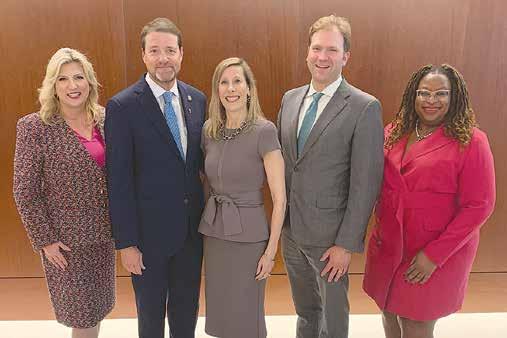
Bill Mateja Elected President-Elect
Members of the Dallas Bar Associa tion proudly elected its 2023 officers during the Annual Meeting on November 4. Bill Mateja was elected president-elect and will serve as the Association’s 115th president in 2024.
Mr. Mateja is a partner at Sheppard Mul lin. A graduate of Texas Tech University School of Law, he specializes in white collar defense and corporate investigations. He has been on the DBA Board of Directors since 2015 and is currently the Board Advisor to the Admissions & Membership and Mock Trial Committees and the Securities Sec tion. In addition to his DBA Board service, Mr. Mateja was Co-Chair of the 2015-2016 EAJ Campaign, which raised $1 million dol lars for access to justice.
Other officers elected at the Annual Meet ing were: Vicki Blanton, of AT&T, elected first vice-president; Jonathan Childers, of Lynn Pinker Hurst & Schwegmann, elected second vice-president; and Krisi Kastl, of Kastl Law, P.C., will serve as immediate past president, and Cheryl Camin Murray, of GI Alliance will serve as president in 2023.
Additionally, on November 10, ballots for director positions were sent to members and one of the following will assume the position of Secretary/Treasurer: Derek Mergele-Rust or Kandace Walter; and six of the following nominees will assume director positions in 2023: Katie Anderson, Alison Battiste Clement, Stephanie Culpepper, Martin Hoffman, Andrew Jee, Andy Jones, Andrew Milam Jones, Audrey Moorehead, and Sarah Rog ers. Ballots were due back November 21, and results were not available at press time. The 2023 presidents of the minority bar associa tions will also serve on the board as Directors, and the president-elects of these associations will serve on the board as Advisory Directors, including the president-elect of the Dallas LGBT Bar Association. The Dallas LGBT Bar Association president will have a direc tor position on the board, in accordance with an amendment to the DBA bylaws that was
approved at the meeting.
On November 9, the DBA hosted its annual Awards program where several award recipients were recognized. Each year, the Texas Center for Legal Ethics & Profes sionalism co-sponsors the presentation of the Morris Harrell Professionalism Award with the DBA. The award was created in 1999 in honor of DBA Past President Morris Harrell to recognize an attorney who best exemplifies, by conduct and character, truly professional traits who others in the bar seek to emulate. This year’s Morris Harrell Professionalism Award recipient is Carolyn Wright, Chief Justice of the Fifth Court of Appeals (Retired).
In 2017, the DBA created the Kim Askew Distinguished Service Award. The award recognizes DBA members who have demonstrated a lasting dedication to the DBA and Dallas community, consistently given back, and who gone above and beyond traditional service of DBA members. This year’s award went to John Goren, Attor ney at Law, for his many years of dedicated service to the DBA, especially for his work on the House Committee, as Chair of the Memorial & History Committee, and as a
founding member of the Appellate Law Sec tion.
The DBA created the Al Ellis Community Service Award in 2019 to honor and recognize those DBA members who exem plify the spirit of community involvement and service. This year’s recipient is Mar tha Hardwick Hofmeister, of Shackelford, Bowen, McKinley & Norton, LLP, for her many years of service to Bar None and the Dallas Bar Foundation, particularly her role in raising money for the Sarah T. Hughes Diversity Scholarships.
The Karen McCloud Outstanding Minority Attorney Award was presented to Alison Battiste Clement, of Battiste Clem ent PLLC. And E. Leon Carter, of Carter Arnett PLLC, received the Judge Merrill Hartman Support Award, for his continued support of the DBA Home Project.
This year two Committees received the Jo Anna Moreland Outstanding Commit tee Chair Award: the Home Project Com mittee Co-Chairs Mr. Michael Bielby, Jr., of Vinson & Elkins LLP; Mr. David Fisk, of Grotefeld Hoffmann, and Mr. Frank George III, of Vinson & Elkins LLP; and the Public Forum Committee Chair Mr. Andrew
M. Jones, of Publicis Resources. The Labor & Employment Law Section, chaired by Rob Wiley, of Rob Wiley, P.C., received the Cathy Maher Special Section Award.
Presidential Citations were also presented to behind-the-scenes members who have faithfully performed often time-consuming tasks for the association. This year’s recipi ents were: Dawn Budner, Laurie Pierce, and Rosalyn Tippett, for their work on the DBA Relaunch Program; Katie Anderson, Leslie Chaggaris, Marc Katz, Jervonne Newsome, Cortney Parker, and Koi Spur lock for their outstanding efforts on behalf of the Allied Dallas Bars Equality Commit tee; Vicki Blanton and Paul Wingo for their efforts on behalf of the DBA 2022 Law Day Program; Lisa George for her work on the DBA Trailblazers Program; Hilda C. Gal van and Harriet E. Miers for their wis dom and guidance, particularly as the DBA moves forward after the shutdowns of 2020 and 2021; Al Ellis, Liz Lang-Miers, and Peter Vogel for their efforts mentoring DBA leaders and members not only in 2022, but for many years before; Kandace D. Walter for her work on the 2022 DBA Presidential Inaugural; Katie Bandy Weber and Kate Kilanowski for their work on the Inaugural Silent Auction benefiting DVAP; Marifer Aceves for her outstanding effort on behalf of the DBA Law in the Schools & Com munity Committee; and Tim Newman and Drew Spaniol for their efforts on behalf of the DBA Bench Bar Conference Committee.
Also, the following court staff members were recognized: 134th District Court, Hon. Dale B. Tillery, Outstanding Civil District Court Staff; County Court at Law No. 2, Hon. Melissa Bellan, Outstanding County Court at Law Staff; Criminal Dis trict Court No. 2, Hon. Nancy Kennedy, Outstanding Criminal District Court Staff; County Criminal Court 3, Hon. Audrey Moorehead, Outstanding County Criminal Court Staff; 301st Family District Court, Hon. Mary Brown, Outstanding Family District Court Staff; and the Probate Court, Hon. Brenda Thompson, Outstanding Probate Court Staff; and Place 12, Hon. Ken Molberg, Outstanding Dallas Court of Appeals Staff. HN
~ In Memoriam ~
Since 1875, the DBA has honored recently deceased members by passing resolutions of condolences. This tradition continues through the work of the DBA Memorial & History Committee. To view the Memorial Resolutions presented to the families of deceased members, visit www.dallasbar.org.
Hon. Bill Hugh Brister (1930-2022), a 1958 graduate of The University of Texas School of Law
William Temple Burke, Jr. (1935-2022), a 1961 graduate of St. Mary’s University School of Law
Russell Dale Chapman (1951-2021), a 1978 graduate of University of Tulsa College of Law
Paul Raymond Clevenger (1957-2022), a 1983 graduate of Southern Methodist University School of Law
James Edgar Cowles (1934-2022), a 1961 graduate of The University of Texas School of Law
James Calvin Crain (1948-2021), a 1975 graduate of The University of Texas School of Law
Robert Edwin Davis, Sr. (1934-2022), a 1958 graduate of Southern Methodist University School of Law
Raymond John Elliott (1937-2022), a 1962 graduate of University of Michigan Law School
Forrest Lynn Estep, Jr. (1931-2022), a 1958 graduate of Southern Methodist University School of Law
Jerry Carl Gilmore (1933-2022), a 1957 graduate of The University of Texas School of Law
Thomas Andrew Giltner (1940-2022), a 1964 graduate of The University of Texas School of Law
Robert Tate Gorman (1976-2022), a 2001 graduate of St. Mary’s University School of Law
Jay Louis Gueck (1936-2021), a 1963 graduate of University of Colorado Law School
Orrin Lea Harrison, III (1949-2022), a 1974 graduate of Southern Methodist University School of Law
Norman Peters Hines, Jr. (1928-2022), a 1960 graduate of Southern Methodist University School of Law
Thomas Patton Jackson (1951-2022), a 1981 graduate of Southern Methodist University School of Law
Richard Archer Lempert (1932-2022), a 1955 graduate of Columbia Law School
Elaine Tran Lenahan (1972-2022), a 1998 graduate of Southern Methodist University School of Law
Curtis Lewis Marsh (1960-2022), a 1985 graduate of Washington University School of Law
Clark Jio Matthews, II (1936-2022), a 1961 graduate of Southern Methodist University School of Law
Frank Eugene McLain (1937-2022), a 1962 graduate of The University of Texas School of Law
Benjamin Prater Monning, III (1951-2022), a 1976 graduate of Southern Methodist University School of Law
Durward Dee Moore (1942-2022), a 1965 graduate of Baylor School of Law
Bruce Knox Packard (1960-2022), a 1985 graduate of University of Michigan Law School
John Theodore Palter (1960-2022), a 1985 graduate of Drake University School of Law
Philipa Tillery Remington (1949-2021), a 1978 graduate of Southern Methodist University School of Law
William Thomas Satterwhite (1933-2021), a 1958 graduate of Baylor School of Law
Kurt Allen Schwarz (1957-2022), a 1990 graduate of The University of Texas School of Law
Dorothy Elizabeth Houston Shead (1952-2022), a 1977 graduate of Southern Methodist University School of Law
William Coleman Sylvan, II (1950-2022), a 1975 graduate of Southern Methodist University School of Law
Steven Herb Thomas (1960-2021), a 1989 graduate of The University of Texas School of Law
Lee Daniel “Tom” Vendig (1931-2022), a 1955 graduate of Southern Methodist University School of Law
William D. White, Jr. (1935-2022), a 1960 graduate of The University of Texas School of Law
Gerry Neal Wren (1931-2022), a 1956 graduate of Southern Methodist University School of Law
6 Headnotes l Dallas Bar Association December 2022
STAFF REPORT
2023 Officers include: (left to right): Krisi Kastl, Bill Mateja, Cheryl Camin Murray, Johnathan Childers, and Vicki Blanton.







C M Y CM MY CY CMY K
BY JOEL CROUCH
The federal tax system is a voluntary system that relies on taxpayers to file complete and accurate tax returns and other information with the IRS. How ever, sometimes after a tax return or other information is filed with the IRS, a taxpayer discovers it was incomplete or inaccurate. In order to avoid potential civil or criminal penalties, the tax payer may want to act. This article dis cusses some of the options that taxpay ers have for addressing incomplete or inaccurate tax filings.
In situations where there was a fraudulent position taken on a tax return and the taxpayer is concerned about potential criminal exposure, the taxpayer can make a voluntary disclo sure to the IRS. Although voluntary disclosure to the IRS does not automat

ically guarantee immunity from prose cution, as a matter of practice the IRS will not pursue criminal charges against a taxpayer who meets the requirements of the voluntary disclosure program. A voluntary disclosure occurs when a tax payer timely, truthfully, completely and voluntarily notifies the IRS about an inaccuracy in a tax return or other doc ument filed with the IRS. A disclosure is timely only if it is made before the IRS has provided notice of its intent to initiate, or has initiated, a civil exami nation or criminal investigation of the taxpayer. In addition, any disclosure must be made before a third party alerts the IRS of the taxpayer’s noncompli ance. A taxpayer who is concerned that a former spouse, disgruntled employee, or former business partner may provide information to the IRS should consider making a voluntary disclosure before
someone else contacts the IRS.
An IRS voluntary disclosure is initi ated by completing and filing IRS Form 14457. If the IRS accepts the taxpayer’s voluntary disclosure, the taxpayer must file all required returns and reports, and pay any additional tax and interest for the six most recent tax years. The returns will be assigned to an IRS exam iner for review and the taxpayer must cooperate with the IRS examination. A taxpayer who fails to cooperate will be kicked out of the voluntary disclosure program and be subject to all available civil and criminal penalties. For most taxpayers in the program, the IRS will assess one 75 percent civil fraud penalty for the year with the highest tax liabil ity. In cases involving undisclosed foreign bank accounts, the IRS will typi cally cap the penalty at 50 percent of the highest year’s account balance.
In situations involving an inaccu rate (but not fraudulent) tax return, a taxpayer can simply file an amended tax return that corrects any omis sion or inaccuracy and, in most cases, the amended return will be a Quali fied Amended Return (QAR) and the IRS will not assess a penalty. A QAR is defined as an amended return filed after the due date of the original return and before (1) the taxpayer is first con tacted by the IRS regarding an exam ination or (2) the date a summons is served on a third party with respect to an activity of the taxpayer for which the taxpayer directly or indirectly claimed a tax benefit.


Taxpayers who fail to report foreign financial assets and pay all tax due on those assets have the alternative of
on

using the Streamlined Filing Compli ance Procedure (SFCP). The SFCP procedure is available to taxpayers certify ing that their failure to report foreign financial assets and pay all tax related to those assets did not result from will ful conduct on their part. In addition to paying any additional tax due, a miscel laneous offshore penalty equal to five percent of the highest aggregate value of the taxpayer’s unreported foreign financial assets may be applicable.
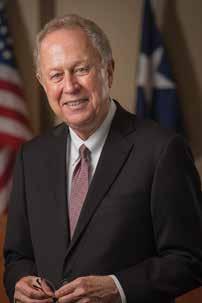
Taxpayers who have paid all their taxes, but who have not filed a required Report of Foreign Bank and Finan cial Accounts (FBAR) (FinCEN Form 114), can use the Delinquent FBAR Submission Procedure. The IRS will not impose any penalty if the taxpayer has not previously been contacted regarding an income tax examination or a request for delinquent returns for the years for which the delinquent FBARs are submitted.
Finally, taxpayers who have paid all of their taxes, but who have not filed one or more required interna tional information returns, can use the Delinquent International Information Return Submission Procedures. The IRS will not impose a penalty for fail ure to file the delinquent international information returns if the taxpayer has reasonable cause for not timely filing the information returns and has not previously been contacted by the IRS about the delinquent information returns. HN
Joel Crouch is a Partner at Meadows Collier Reed Cousins Crouch & Ungerman, LLP and can be reached at jcrouch@ meadowscollier.com.

8 Headnotes l Dallas Bar Association December 2022
Options for Correcting Mistakes and Omissions
Tax
Focus Probate, Trusts & Estates/Tax Law 901 Main Street, Suite 3700 Dallas,Texas 75202 phone (214) 744-3700 (800) 451-0093 Meadows Collier has been providing business, tax and regulatory solutions to individuals and corporate clients since 1983. Our attorneys provide services in the following practice > Income Tax Litigation > Income Tax and Business Planning > Estate Planning and Probate > Estate and Gift Tax Litigation > State Tax Planning and Litigation > White Collar and Government Regulatory Litigation > Real Estate > Corporate > Commercial Litigation and Arbitration > Cryptocurrency and Digital Assets www.meadowscollier.com Meadows Collier: Guiding clients with superior service for nearly 40 years. Please Join Us! Dallas Bar Association Martin Luther King Jr. Luncheon Monday, January 16, 2023 Noon at the Arts District Mansion 2101 Ross Avenue, Dallas, TX MLK Justice Award to be presented to Judge W. Royal Furgeson
Returns

December 2022 Dallas Bar Association l Headnotes 9 IP LITIGATION + COMMERCIAL LITIGATION
#FreeBritney Puts Restorations in the Spotlight Focus Probate, Trusts & Estates/Tax Law
 BY TANNER HARTNETT
BY TANNER HARTNETT
Britney Spears’s conservatorship (guardianship) recently took the world by storm. It has put a spotlight on guardian ships and raises questions about when, and if, a guardianship should be lifted. In Texas, there are numerous reasons individuals are placed under a guardianship includ ing intellectual disability, developmental delays, traumatic brain injuries, and diseases associated with aging. Britney’s case seemed to focus on a mental health break down that spiraled out of control, which is not something that typically gives rise to a guardianship in Texas, though it can. Ms. Spears ultimately made strides
towards independence, which, along with an avid fan base, gave rise to the #FreeB ritney movement, and her ultimate restoration. Though individuals in Texas may lack a worldwide army of keyboard warriors, their guardians should be their number one fans and advocate for their restoration the moment it is warranted.
The Texas Estates Code provides a cou ple of different ways to seek a restoration or modification of a guardianship. The first allows the ward, or anyone interested in the ward’s welfare, to write a letter to the court asking for the complete restoration of their rights or a modification to get some, but not all, rights back. These letters may be considered by the court annually. The sec
ond way is for the guardian to seek the res toration when they know that the ward has regained some or all of their abilities. This is actually required of them by the Ward’s Bill of Rights codified in the Estates Code, and is usually mentioned in their annual report. The moment the guardian is aware that the ward has regained some, or all, of their abilities they should immediately seek restoring the ward’s independence. Brit ney’s father certainly did not seek restoration on her behalf, but many parents want their kids to achieve independence.
should always be looking for when and how to restore rights and, when that is not pos sible, looking for any available less restrictive alternatives to guardianship that could continue to provide the assistance needed.
Thursday, December 8 | Noon - 1:00 PM
MCLE: 1.00 Ethics
Donna Yarborough specializes in difficult Estate, Trust and Guardianship litigation.
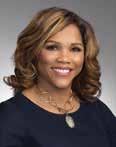
Donna’s ability to handle emergency cases and obtain temporary restrain ing orders has resulted in her being described by her peers as the “911 attorney” for probate litigation. In addition to estate administration, Donna has been successful in having her clients declared common law spouse and adoption by estoppel so they could
inherit from an Estate. With over 21 years experience, she is dedicated and a zealous advocate for her clients.
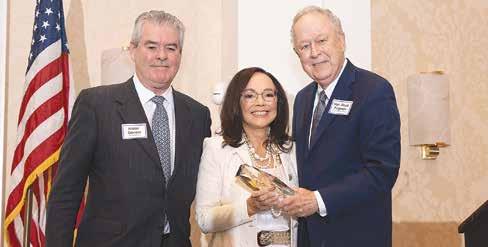

Donna was named a 2021 Super Lawyer and a Top Attorney in Texas selected by peer recognition and professional achievement in 2022 by Texas Monthly.


If your client has an emergency you do not want or cannot handle, call Donna on her cell at (214) 682-7557.
Holmes Firm PC International Plaza III 14241 Dallas Parkway Suite 800, Dallas, TX 75254 donna@theholmesfirm.com | 214-682-7557 | www.theholmesfirm.com
Regardless of how the restoration request is made, it will trigger a series of events leading up to a final hearing. An Application for Restoration and/or Modi fication (ask for both when you aren’t sure your client is ready for full independence) must be filed. The court investigator will visit the guardian and ward and file a report with the court. Then an attorney and/or guardian ad litem will be appointed to rep resent the ward. Additionally, a new doc tor’s letter will need to be obtained noting the improvement in cognitive functioning and the absence or improvement of any deficits. These steps should give every one ample opportunity to consider how the ward’s condition has improved, how circumstances may have changed, and whether any further protection of the ward is needed. This evidence should never be looked at through the perspective of what problems remain and instead should be looked through the perspective of what has improved. The parties and the Court
Many people focus only on the nega tive side of guardianships, where guard ians allegedly suppress the ward’s rights and exploit them for financial gain. Those same people often misunderstand how guardian ships truly work. When used appropriately, guardianships are a useful and necessary tool for individuals and their families, and they should continue to be granted when doing so will protect an individual during a period of vulnerability. Once that period ends, however, so too should the guardianship. It is important that guardians and wards do not get complacent within the confines of the guardianship and always look for oppor tunities to give wards more independence, with a final goal of restoration.
A final, interesting note about restora tion is that the order restoring rights will not restore the individual’s right to possess a firearm. That requires not only a separate request, which can be made within the original application, but also a separate order that complies with federal statutes. The issues sur rounding restoration of gun rights are exten sive, complicated by current events, and require an evaluation of judgement, which is nearly impossible to quantify, and will have to be saved for another day. HN
10 Headnotes l Dallas Bar Association December 2022
Tanner Hartnett is a Partner at The Hartnett Law Firm. She can be reached at tanner@hartnettlawfirm.com
Veronica Moyé Gibson, Dunn & Crutcher LLP
Your 2023 dues statements have arrived and we ask that you consider renewing as a Sustaining Member ($535). More than 200,000 members and guests use our building each year and your contribution at the Sustaining Member level will help us continue the essential upkeep needed to preserve our beautiful building—as the premiere bar headquarters in the nation. Thank you for your support. HELP PRESERVE OUR HEADQUARTERS: BECOME A SUSTAINING MEMBER All Sustaining Members will be prominently recognized in Headnotes and at our Annual Meeting.
Hosted virtually on Zoom. Register at Dallasbar.org. Interviewed by Gracen Daniel, Griffith Barbee PLLC
The Dallas Bar Foundation presented Hon. Karen Gren Scholer (center), of the U.S. District Court Northern District, with the Fellows Justinian Award. Judge Scholer is pictured with Alistair Dawson (left) and 2020-2021 Fellows Justinian Award recipient, Hon. Royal Furgeson (right).
Hon. Karen Gren Scholer
Receives Fellows Justinian Award


December 2022 Dallas Bar Association l Headnotes 11 But that comes with the territory when you retain one of the region’s most effective and accomplished personal injury firms. For over 25 years, we’ve worked relentlessly to help personal injury victims secure the justice they deserve, while actively spurring changes to make our world safer. If you know someone who is a victim of a catastrophic personal injury matter, visit paynemitchell.com to make a referral or to find out more about our notable results. OUR CLIENTS OFTEN GET CALLED NAMES IN COURT, LIKE COMPENSATED, VINDICATED + AWARDED. 214.252.1888 • paynemitchell.com AVIATION CRASHES • PRODUCT DEFECTS • NEGLIGENCE MEDICAL MALPRACTICE • VEHICLE COLLISIONS Left to right: Jim Mitchell, Andy Payne, Todd Ramsey PMR Firmad2022_Headnotes_021422.indd 1 2/23/22 11:04 AM
BY JEFF SHORE
One of the most troubling events for estate planning attorneys is when their married clients get divorced. This is because a divorce drives a wedge through the middle of the marital estate and puts the attorney who helped plan the estate at the center of the fray.
An impetus for problems arising in these types of situations is that married couples often start the estate planning process at a time when they are deeply in love, share mutual goals of building wealth together, and are not thinking about what happens if their relationship sours. By the time of divorce, however, these spouses’ interests will likely have changed dramatically. The mutuality of interest from years prior is often replaced by frantic and competing desires to reclaim property that they brought into the marriage, and achieve financial independence from the other spouse. Unfortunately, this sudden
change in their interests puts the couple’s estate planning attorney in the middle of the conflict. And clients, who once may have been very satisfied with the attorney’s work, often become angry about how their assets are tied up in the marital estate.
If not prepared to navigate this com mon scenario, the estate planning attorney will be put in a difficult position, and find him or herself at risk for a potential mal practice claim. However, there are a number of measures that lawyers can undertake at the outset of client representation to limit his or her future exposure.
First, the attorney should have both spouses complete and sign forms declaring all property they intend to maintain as sep arate property during the marriage. Sepa rate property is any property owned before marriage and any property acquired during the marriage by gift, inheritance, or as com pensation for personal injury damages such as pain and suffering. If a dispute arises in

Dedicates 32nd Habitat House

a future divorce regarding the treatment of any property that was not previously dis closed, the attorney will have a clear record of the clients’ stated instructions in the file.

Second, the attorney should develop a handout explaining joint representations for an estate plan and the potential con flicts that may arise. Prior to beginning the joint representation, have the clients sign a form acknowledging they were provided this information in writing and that they agree to waive any conflicts of interest. If the couple later divorces and one of the spouses tries to claim his or her interests were not appropri ately served, the attorney will have a clear record of the written waiver as reference.
Third, the attorney should provide other written disclosures that the attorney deems to be necessary at the outset of engagement. These disclosures can be tailored depending on particular client situations or other unique circumstances. At a minimum, include dis closures about the differences between sepa rate and community property. Also disclose how spousal interests often change in the event of divorce, family deaths, or other contingent events that may arise. A discussion of options for these possibilities is a necessary element of a client being able to provide “informed consent” for a particular estate plan. The lawyer may also want to ask the clients to sign a disclosure acknowledg ing that they are giving up important marital property rights to accomplish their desired estate plan. The lawyer should keep all signed disclosure forms in a file. These signed documents will help protect the lawyer from becoming a target for client unhappiness at the time of a future divorce.
Fourth, the attorney should be well prepared to field questions about the pos sibility of unwinding an estate in the event
of a future divorce. This is not always an easy task. For example, there are special rules when clients use legal entities as part of their estate planning goals. When a spouse as part of an estate plan conveys his or her separate property into entities such as a trust or family limited partnership, the contributed property loses its separate prop erty character and becomes the property of the entity itself. Additionally, if the enti ties are created during the marriage, the spouses’ ownership interests in these entities are treated as community property. They will have no direct interest in the property contributed to the entity. In some estate plans, only one of the spouses has manage rial powers over the entity, yet both spouses will still hold the same undivided, commu nity property interest in the entity itself. At the time of divorce, the court will value and award a spouse’s interest in the entity, but not the property owned by the entity. While a divorcing spouse can ask the court to dis solve an entity and distribute its assets, how readily that can be accomplished depends, in part, on the terms of the formation docu ments. Importantly, if a spouse contributed separate property to the entity and is suc cessful in getting the court to order disso lution of the entity and distribution of the assets, the property being returned out of the entity will be community property—and will not revert to its prior separate character.
By preparing in advance and taking the right steps at the outset of representing married couples, an estate planning attorney’s effort will go a long way in protecting them selves from the claims of their clients in the event of a future divorce. HN
l l e l e d a d v i c e a n d e x p e r t i s e a s t h e y d e t e r m i n e h o w t o b e s t a d d r e s s t h e i r e s t a t e n e e d s

12 Headnotes l Dallas Bar Association December 2022
Jeff Shore is a Partner at Goranson Bain Ausley, PLLC. He can be reached at jshore@gbafamilylaw.com.
Family Law Issues Often Complicate Estate Planning Focus Probate, Trusts & Estates/Tax Law D U F F E E + E I T Z E N | D E L A W . C O M W h i l e d i v o r c e m a y b e g i n a n d e n d w i t h D + E , a t t i m e s a m a r r i a g e m a y a l s o e n d i n d e a t h W h e n t h o s e t i m e s a r i s e , a t t o r n e y s a t D u f f e e a n d E i t z e n a r e g r a t e f u l f o r o u r p a r t n e r s h i p s w i t h m a n y s t r o n g e s t a t e p l a n n i n g a n d p r o b a t e f i r m s t o p r o v i d e o u r c l i e n t s u n p a r a
D U F F E E + E I T Z E N | F A M I L Y L A W
A W . C O M | 2 1 4 . 4 1 6 . 9 0 1 0
| D - E L
On October 22, the DBA dedicated its 32nd Habitat for Humanity home to the Garcia family, with DBA President Krisi Kastl making a special presentation to the family. Thank you to all the DBA members and firms who donated this year, and a special thank you to DBA Home Project Co-Chairs David Fisk and Michael Bielby, Jr. To participate in the project for next year, contact Mr. Fisk at dfisk@krcl.com. (Left to right): Araceli Rodriguez, Ms. Kastl, Al Ellis, Esperanza Garcia, Preston Rose, Mr. Fisk, and Mr. Fisk’s son.
DBA
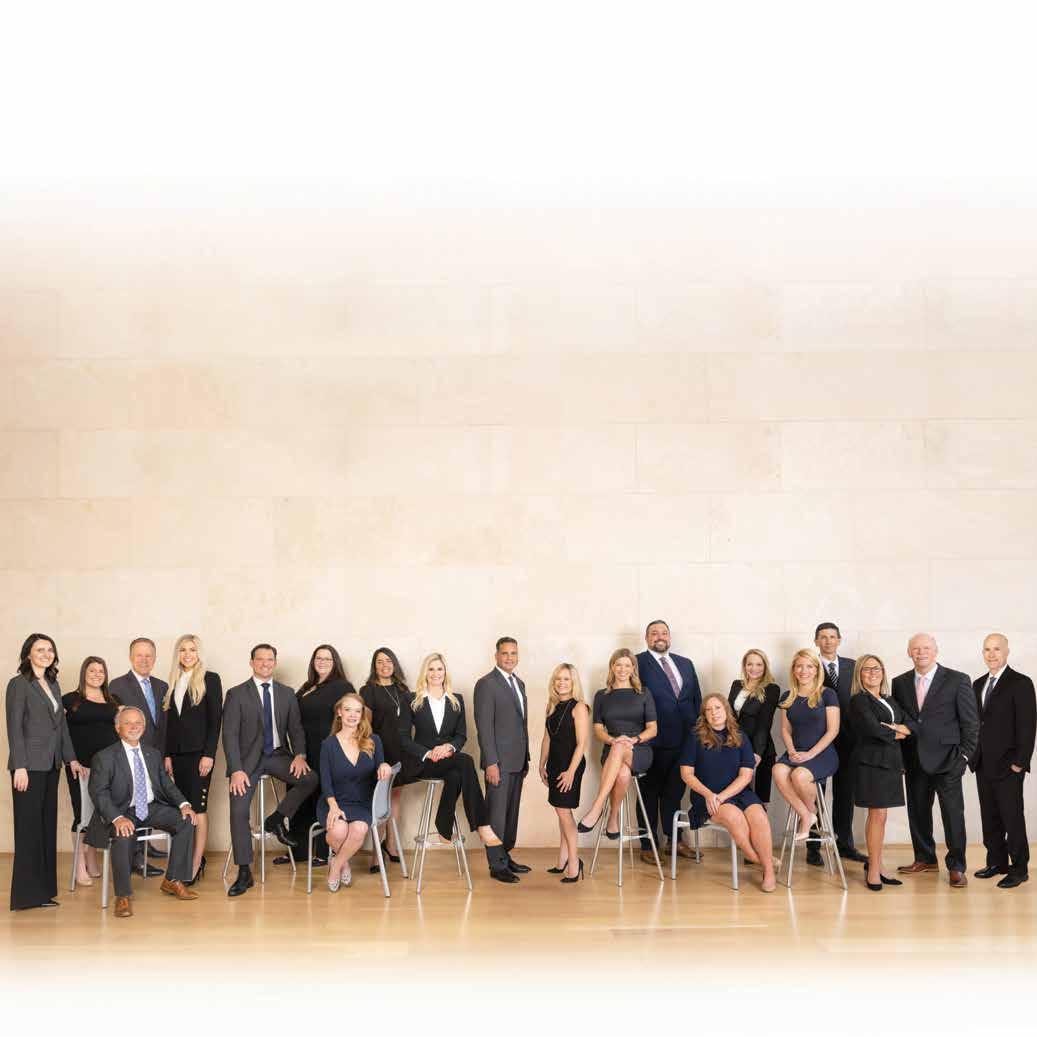
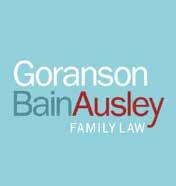


December 2022 Dallas Bar Association l Headnotes 13
BY SHANNON A. WEBER
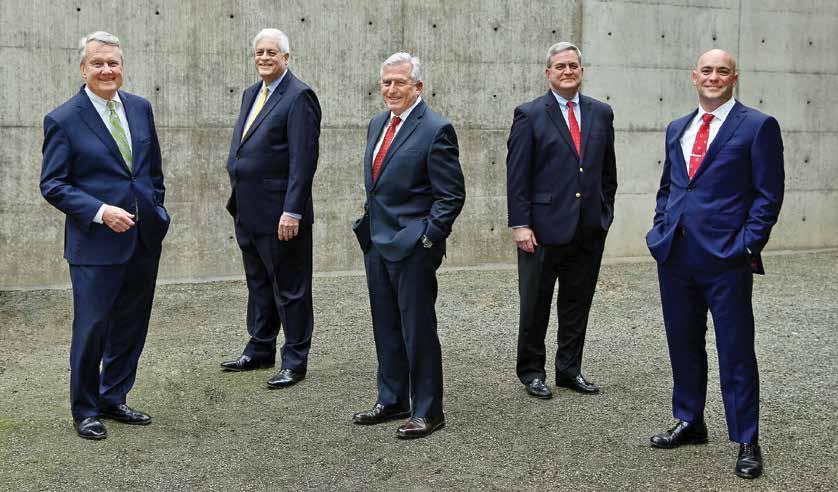
According to petpedia.com, over ninety percent of pet owners consider their animals to be part of the fam ily. Thus, it only makes sense that pet parents put a plan in place to care for their pets in the event of incapacity or death.
To plan for incapacity, pet parents should execute a Durable Power of Attorney (a DPOA) including specific instructions regarding pet care. In a DPOA, a pet parent (the “principal”) may name an agent to handle his or her financial affairs on his or her behalf (e.g., in the event of incapacity). Texas Estates Code Section 752.051 provides a statutory form for a DPOA, which includes numerous “default” powers a principal may grant to an agent. One of

those powers regards personal and fam ily maintenance, which, in part, grants the agent legal authority to provide for the principal’s pets. A principal may also include specific instructions in the DPOA directing for pet care (e.g., naming a pet’s vet, medication, the general standard of care the principal intends for the pet to receive, or esti mated costs the principal deems rea sonable for pet care and maintenance). The more detail a principal provides in a DPOA, the more likely that the prin cipal’s intent will be achieved.
To provide for pets after death, pet parents should specifically provide for the ultimate disposition and care of pets in their wills or revocable trusts (their “estate planning documents”). Despite many pet owners’ feelings to the contrary, pets are considered
tangible personal property in Texas. Accordingly, if a pet owner does not provide for a specific disposition of his or her pets pursuant to his or her estate planning documents, then technically, the pets will be distributed in the same manner as the decedent’s tangible personal property (clothing, furnishings, etc.).
Therefore, pet parents should think about whom they wish to care for their pets in the event their pets survive them. To do so, pet parents may sim ply designate a succession of individu als to receive their pet at death in their estate planning documents. That des ignation may also be accompanied by a cash gift or specific pet-maintenance instructions. If taking this approach, a pet parent should ensure that the lineup of individuals to receive the pet is long enough so that there will always be someone to ultimately care for his or her pet. Naming a life care center at the back of the lineup for that purpose may be appropriate.
Of course, leaving pets and cash to individuals outright leaves no opportu nity for a deceased pet parent to pre vent abuse of that arrangement. If a pet parent is concerned about ensuring a pet is properly cared for and funds left for that purpose are prop erly expended, he or she may consider utilizing a pet trust. Pet trusts are also useful to provide continuing care and oversight with regard to specialty-use animals (e.g., breeding animals, race horses, etc.). Texas Trust Code Section 112.037 authorizes the creation of pet trusts. A pet trust can be created dur
ing the pet parent’s lifetime (in which case it will aide in a seamless transition of care for the pet in the event of inca pacity of the pet parent) or it can be created upon the pet parent’s death (in his or her estate planning documents).
A pet trust is created for the benefit of a human beneficiary who serves as the caretaker of the pet. The caretaker has the right to enforce the terms of the trust (on behalf of the animal). A trustee is appointed to distribute petcare funds to the caretaker and other wise administer the trust. Appointing different individuals to serve as caretaker and trustee introduces checks and balances, ensuring the pet is properly cared for. The trust instrument may be drafted to define and mandate certain care for the pet. Pet trusts are funded with a pet parent’s interest in his or her pets and an appropriate amount of cash to fund lifetime care expenses for the pets and compensation for the caretaker and trustee (if preferred). Notably, a court may reduce a pet trust’s funding amount if it is unreason ably large. Pet trusts terminate at the pet’s death, at which time any remain ing property will generally pass in the manner the pet parent provides in the agreement.
As is the case in providing for human family members, pet parents should give some thought to providing for pets in the event of incapacity or death. They have a lot of flexibility for doing so.
HN
14 Headnotes l Dallas Bar Association December 2022
Shannon A. Weber is an associate at Davis Stephenson, PLLC. She can be reached at shannon@davisstephenson.com.
What About Fido!? Planning for Pets Upon Incapacity or Death Focus Probate, Trusts & Estates/Tax Law FEDERAL & STATE CRIMINAL DEFENSE | FEDERAL & STATE CIVIL TRIAL MATTERS Knox Fitzpatrick ✯ Jim Jacks ✯ Bob Smith ✯ Mike Uhl ✯ Ritch Roberts 500 NORTH AKARD STREET, ROSS TOWER, SUITE 2150 DALLAS, TEXAS 75201-6654 | 214-237-0900 *Independent Law Offices Texas Lawyers’ Assistance Program TLAP provides confidential help for lawyers, law students, and judges who have problems with substance abuse and/or mental health issues. In addition, TLAP offers many helpful resources, including: Live Ethics CLE presentations TLAP Newsletter Request of specific educational materials 1-1, group telephone calls on topics Friday noon AA telephone meeting 1-800-393-0640, code 6767456 Find out more at www.texasbar.com.

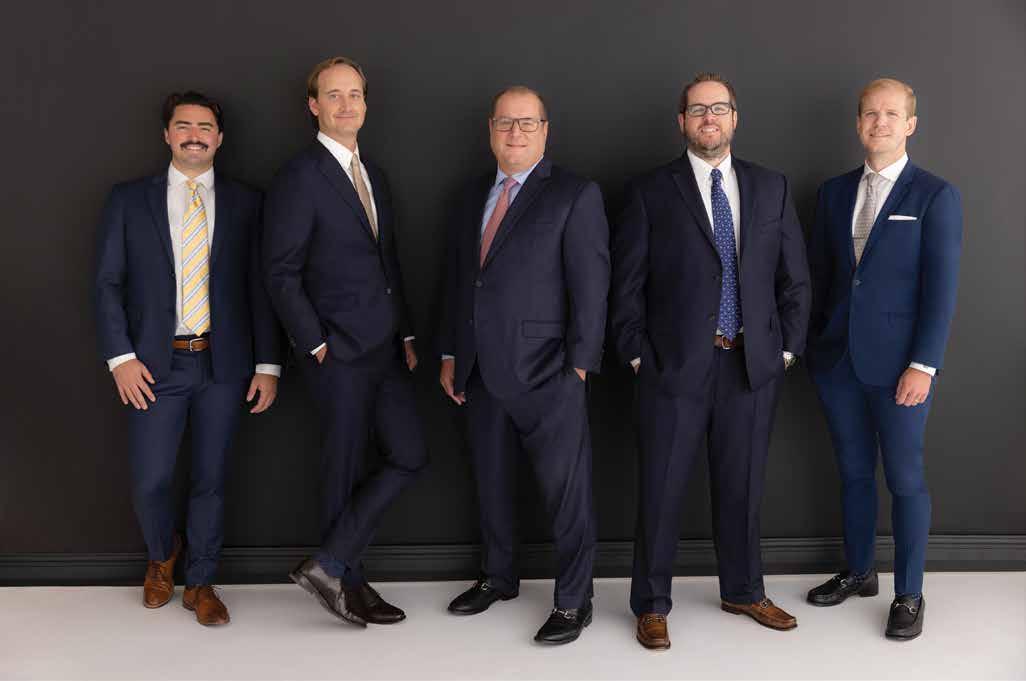
December 2022 Dallas Bar Association l Headnotes 15 Spencer, Johnson & Harvell, PLLC focuses its practice on Will Contests, Trusts Disputes, Guardianships, and Fiduciary Litigation, and all associated litigation. Referrals Welcomed 500 N. Akard Street, Suite 2150 | Dallas, TX 75201 | 214-965-9999
P. Harvell
Spencer
E. Johnson
Brandan
R. Kevin
Zachary
O. Spencer Merry Christmas & Happy Holidays! Best Wishes for a Prosperous New Year!
Samuel B. Sheffer Blake
BY BROOKS CASTON
Despite the significant amount of time and money collectors invest in their col lections, I am routinely surprised at how often collectibles are neglected within the collector’s estate plan. While there are a multitude of considerations to examine when planning for a collection, this article is limited in scope to address ing insuring, inventorying, and commu nicating about a collection to facilitate more effective management, administra tion, and disposal of the collection.
Insurance
Many benefits result from properly insuring a collection, including providing the collector with a general inventory of the collection, a general value of the items comprising the collection, and financial security should a loss event occur. Many collectors mistakenly assume their home owners or umbrella insurance covers their collectibles. Most of the time, these policies do not cover the collection, or if they do, the coverage is often insufficient. Accordingly, a collector should revisit the terms of their relevant insurance policy to ensure sufficient coverage and, if needed, consider additional insurance coverage for their collectibles.
Inventory
An inventory is often ignored in the excitement of collecting, but if given the necessary time and attention, a well-pre pared inventory can serve as a useful col lection management and administrative tool for the collector, his or her personal

representative and the ultimate beneficiaries of the collection.
In general, an inventory should include the following information:
• Description (including condition) and picture of the item;
• Location of the item;
• Date of acquisition;
• Present value (depending upon the item, it may be advisable to obtain an appraisal);
• Cost basis (determination depends, in part, upon collector’s method of acqui sition, i.e., purchase, gift or devise/inheri tance);
• Paperwork associated with the item (e.g., bill of sale, authentication documentation; insurance documentation, receipt, invoice, assignment, condition report, appraisal, other title documenta tion, etc.);

• Documentation regarding marital property characterization (e.g., separate property or community property);
• Any other relevant information unique to the collection.
The inventory should be periodi cally revisited and revised as necessary to reflect an accurate and up-to-date catalog of the collection.
Communication
For a collector, when it comes to deciding upon a disposition plan, the resulting outcome is often simply a bequeathal of the collection to the col lector’s family members, such as spouse or children without further instruction or guidance. Unintended consequences may result in the absence of clear direc tion provided to the collector’s personal
representative or beneficiaries in connection with the administration of the col lection. For example, a family feud may erupt absent clear and direct communi cation during the planning phase result ing in undesirable (and costly) litigation. To mitigate the potential for unintended consequences, here are some pointers:
• Talk to family members. Many collectors mistakenly assume that their fam ily beneficiaries will want and be happy with the collection. However, oftentimes the foregoing assumptions are not the reality. If the beneficiaries do not want the collectibles, the collector should con sider an alternate method of disposition, such as liquidating the collection during life, directing a sale of the collection at the collector’s death and then distributing the net sales proceeds to the beneficiaries, or donating the collection to charity. The ultimate method of disposition should be informed by the beneficiaries’ desires and not what the collector assumes those desires to be.
• If the collector wants a specific indi vidual to receive a particular item from the collection, then he or she should ensure such outcome by making a spe cific bequest of the item in the appropri ate estate planning document, such as a will, trust, or tangible personal property memorandum
• It is likely that pieces of the collec tion will have to be temporarily stored and then shipped to beneficiaries who do
not reside in close proximity to the collector. Therefore, it is necessary to clearly define who bears the burden of such stor age and shipping costs.
• If a collector has identified a group of beneficiaries to receive the collection, he or she must consider setting forth the process by which such items are to be selected (e.g., specify the order of selection, lottery, auction, etc.).
• Frequently, the collector’s personal representative will lack a basic level of knowledge as it pertains to the collection. As a result, he or she should consider des ignating a third party who possesses the necessary collectible expertise to advise and assist the personal representative and beneficiaries in the administration of the collection, such as coordinating apprais als, inventorying the collection, if appli cable, or coordinating with an auction house for the sale of the collection.
Collectors are very intentional about curating and growing their collections. Planning for the proper disposition of the collection requires the same level of intentionality. It is therefore incumbent upon the advisor to encourage the col lector to dedicate the necessary time and attention to such planning so that the collection will be preserved, managed, and disposed of in accordance with the collector’s wishes. HN
Brooks Caston is Of Counsel at Steptoe & Johnson PLLC. He can be reached at brooks.caston@steptoe-johnson.com.

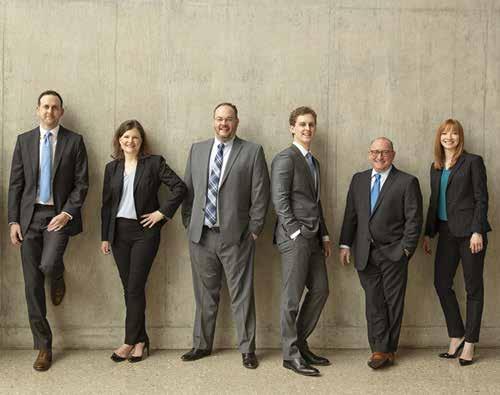
DBA/DAYL Moms in Law
16 Headnotes l Dallas Bar Association December 2022 4851 LBJ Freeway, Suite 601 Dallas, TX 75244 | 972-395-5600 | www.probatetriallawyers.com Trusted Experience. Relentless Resolve. Referrals Welcome Turning chaos into clarity in probate, trust, and guardianship disputes. RISK-TAKING CAN BE FUN... …BUT NOT WHEN IT’S A MALPRACTICE CLAIM. Personal Injury Claim* • Lawyer sued for allowing a default judgment taken against client • Damages of up to $4,000,000 sought ($200,000 policy limit) • TLIE settled case for $300,000 INSURED BY TLIE IF NOT INSURED Deductible $1,000 Defense costs $10,000 Amount over policy limit + $109,000 Settlement + $300,000 Total out-of-pocket = $110,000 Total out-of-pocket = $310,000 * Based on actual claim handled by TLIE. FIND OUT MORE: TLIE.ORG or (512) 480-9074
Focus Probate, Trusts & Estates/Tax Law
Estate Planning and Collectibles
Being a working mom can be challenging. Being a working lawyer mom can be a different ballgame with its own unique challenges. Moms in Law is a no pressure, no commitment, informal, fun, support group for lawyer moms. Join Moms in Law for lunch Monday, December 5, Noon, at the Zodiac Room (located on Level Six of Neiman Marcus downtown) To RSVP for this lunch, email Rebecca Nichols at rebecca.nichols@gmail.com
Bell Nunnally is proud to partner with the Dallas Cowboys.

We believe that behind every great company is a fiercely dedicated team that aids in its success.
Bell Nunnally is a Dallas-based, full-service law firm equipped to handle every legal need, whether in the boardroom or the courthouse.
For four decades, we have empowered our clients to exceed their goals by prioritizing trust, collaboration, respect and resolve.
From the clients we serve and the cases we win to the people we hire and the community we build.
Bell Nunnally. Behind Every Great Company.™ 2323 Ross Avenue, Suite 1900 | Dallas, Texas | 75201 | bellnunnally.com
December 2022 Dallas Bar Association l Headnotes 17
DBA Past President Orrin Harrison Passes Away
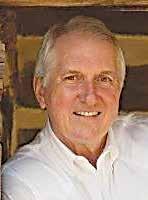
The Dallas Bar Association lost its 83rd president on October 12, 2022, at the age of 73. Orrin L. Harrison, III was president of the DBA in 1992.
Mr. Harrison studied political sci ence as an undergraduate at the Uni versity of the South, and in 1971 he graduated cum laude. He gained his legal education at the SMU Law School, graduating with honors in 1974. As a student he served as research editor of the Journal of Air Law and Commerce
In 1986 he was president of Dal las Association of Young Lawyers (DAYL). Mr. Harrison’s specialty as an attorney was business litigation and antitrust legislation. In addition to being president of the DBA, he served as president of the Dallas chapter of the American Board of Trial Advocates, and on the Board of Directors of the State Bar of Texas.
He was a trustee and life member of the Dallas Bar Foundation and a life fellow of the Southwestern Legal Foundation (now the Center for American and International Law), the Texas Bar Foundation, and the American Bar Foundation.
Mr. Harrison began his legal career at Locke Purnell Boren Laney & Neely. He would go on to become a partner at the firms of Akin, Gump, Strauss, Hauer & Feld, and Gruber Hail, and most recently at Foley Lard ner. In 2007 the American Jewish Congress Southwest Region presented him with the Torch of Conscience Award.
Mr. Harrison served as a former senior warden on the vestry of the
Church of the Incarnation (Episcopal).
He is survived by his loving and devoted wife of 51 years, Paula; son Orrin Lea “Guy” Harrison IV and his children, Giddings, Laney and Ben nett; daughter Erin Hart (Jason) and their children, Harrison, Lillian and Eloise; and daughter Lindsey Harrison and her son, Orrie. He is also survived by his brother, Chris Harrison (Bev erly), and sister, Carol Love, as well as numerous nieces, nephews and God children.
In lieu of flowers, please consider a designated gift to the Church of the Incarnation in memory of Orrin Harrison. Gifts can be made online at https://incarnation.org/orrin-har rison-memorial-fund/ or checks may be sent to the Church of the Incarna tion, 3966 McKinney Avenue, Dallas, Texas 75204. HN
Column Ethics
Keeping Your Fat Out of the Frying Pan: Tips to Avoid Grievances
BY ROBERT TOBEY AND CHAD BARUCH
Every lawyer dreads the prospect of a grievance. The most common reasons for grievance sanctions against Texas lawyers are:
• Lack of communication—28 percent
• Breaches of integrity—24 percent
• Neglect—23 percent
• Issues in declining or terminating representation—14 percent
• Safeguarding client property—11 percent
The top practice areas for sanctions are:
• Civil—39 percent
• Family—23 percent
• Criminal—22 percent
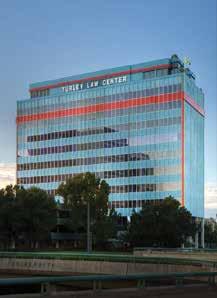
• Personal injury—9 percent
• Probate/wills—7 percent
Here are a few tips for steering clear of grievances:
Set Reasonable Expectations
Clients often file grievances as a result of frustration over the outcomes in their cases. Avoid the temptation to oversell the prospects for success and set reasonable expectations in terms of the overall case and particular matters that arise during litigation.
Establish Clear Payment Requirements
While fee disputes may not account for a substantial portion of the sanctions assessed against Texas lawyers, they do comprise a large percentage of the griev ances that are filed. Responding to these grievances takes time and money. Protect yourself by ensuring that clients under stand their obligations when it comes to fees. And resist the temptation to allow clients to accrue large unpaid balances.
Communicate, Communicate, Communicate
Rule 1.03 requires that you keep each client reasonably informed about the status of a matter and promptly comply with reasonable requests for information. The Rule also requires that you explain a matter to the extent reason ably necessary to permit the client to make informed decisions regarding the representation.
Many grievances arise simply because clients become frustrated when lawyers do not return phone calls or emails. Therefore, a steady flow of communica tion from lawyer to client is one of the most effective means to avoid griev ances.

Communicate Inside the Firm
Remote work presents special challenges for communication among firm staff. If you have lawyers or staff mem bers who work from home, establish pro tocols to ensure adequate communica tion within the firm.
Never Withhold Bad News
Bad news is like stinky cheese: it gets worse with the passage of time. Enough said.
Don’t Create the Client’s Best Exhibit
No matter how justified it may have been, your sarcastic, snarky, hostile, or demeaning email to the client will be exhibit number one in the grievance pro cess. Meanwhile, your consistent polite tone in emails will undercut any allega tion of unprofessional behavior. There fore, be civil in all communications with the client—no matter how much venom you receive in return.
Also, do not let the client create selfserving exhibits by misstating previous communications. The client may send you an email saying “You told me XYZ” when you said nothing of the sort (or even said the opposite). Do not let mis statements go unaddressed. Send a polite but firm email correcting them.
Avoid Forming Unintended Attorney-Client Relationships
If the client has a reasonable basis to believe that an attorney-client relation ship exists, then it probably does. Pro tect yourself against unintended attor ney-client relationships by spelling out the identity of the client explicitly in your engagement letter and disclaiming representation of anyone else.
Take particular care in the common trouble areas of multi-passenger car wrecks, majority and minority venture investors, corporate officers and share holders, limited and general partners, and controlling and non-controlling members of business entities. Disciplin ary Rule 1.07 contains an excellent con flicts checklist to use as a reference.
If you do undertake joint representa tion, your client letter should include at least the following:
• Written confirmation by each cli ent that no conflict exists.
• Client agreement to inform you if a conflict arises.
• Consent to joint representation.
• Your recommendation for separate representation.
Decline Matters Promptly and Clearly
Whether you or someone else does your intake, make sure that they get enough information for you to deter mine, with reasonable certainty, when the statute of limitations will run on the claim. Have a procedure in place for immediate rejection of potential clients whose claims are too close to limitations.
Always send a written communi cation stating clearly that you are not taking the case or otherwise doing any thing else to protect the potential cli ent’s interests. Advise the rejected client that limitations are running and they should retain other counsel to take steps to preserve their claims. But we caution against stating when limitations will expire unless you are absolutely certain.
Conclusion
Of course, an attorney may follow all of these tips and still be the target of a grievance. But adhering to these rules should reduce the risk of having to face the disciplinary process. HN
Robert Tobey is a Shareholder at Johnston Tobey Baruch, and Chad Baruch is Managing Shareholder at the firm. They can be reached at robert@jtlaw.com and chad@jtlaw.com, respectively.
18 Headnotes l Dallas Bar Association December 2022 TURLEY LAW CENTER Professional Friendly On-Site Staff 24-hour Cardkey Access Complimentary Valet Reserved Conference Room (No Charge) High-Speed Internet Deli Serving Breakfast & Lunch Full Service Salon & Spa ATM FedEx Drop Box Near Dart Station Satellite TV Connections Car Detail Service Furnished Executive Suites Conveniently located at N. Central Exp. & University Blvd. Competitive lease pricing. Is your office building “Dog Friendly?” OURS IS! TAKE A TOUR! Email us at Brendag@wturley.com or call 214-382-4118
STAFF REPORT
Orrin Harrison









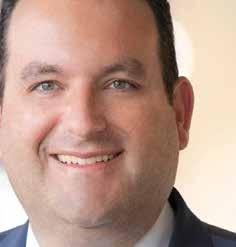










December 2022 Dallas Bar Association l Headnotes 19 Divorce | Child Custody | Prenups and Marital Agreements Your answer to a better future. SERVING THE GREATER DALLAS AREA 5949 Sherry Lane, Suite 1070, Dallas, Texas 75225 | 972-232-7673 | epsteinpc.com Contact Us. Board Certified in Family Law –Texas Board of Legal Specialization
Epstein Managing Partner Resolve to be happier. Let us support you in your desire to move forward and help you strengthen your resolve. Happiness is a choice — Epstein Family Law knows the steps that will help you realize the brighter future you see for yourself and your family.
Robert
Most would agree that saving for retirement is a wise choice. Particularly if those savings are made with your earn ings before income tax. The 401(k) plan is a staple employee benefit, with many employers offering to chip in to their employees’ accounts with matching con tributions. For some, pre-tax retirement accounts can become sizable and should be specifically addressed as part of the overall estate plan.
While it is fun to save, the rules gen erally require you to stop saving and start withdrawing once you reach 72 (unless you are still working and you meet cer tain requirements). The annual mini mum amount that you must begin taking is based on your life expectancy according to IRS tables. When your pre-tax savings are distributed, they are subject to income tax.
If you are not able to withdraw your last penny before you die, then you will want to be sure that you have designated a beneficiary for your retirement account. Your account may be distributed to your
estate if you forget to do that. While your estate plan may direct where those funds go, the result could be disastrous from a financial and income tax perspective.
Any account intentionally made pay able to your estate or that passes to it due to lack of a beneficiary designation will be a probate asset. This means that your executor will not be able to access your account until he or she is appointed by a court. This process can take over three months to complete, during which time your account may be plummeting with the stock market. In addition, while retirement accounts are generally pro tected from creditors, any funds paid to your estate could be subject to claims of creditors after all. Alas, your executor can do nothing to avoid these pitfalls. However, you can take steps now to avoid these issues by ensuring your beneficiary designations are in order.
If you are married, your spouse will likely be your designated beneficiary. Spouses have the ability to roll over your account into their own name, which allows them to take distributions over their own life expectancy. Stretching out
those payments can manage the income tax due. If your spouse is significantly younger than you and may need the retirement funds for his or her support, your retirement account can be put in an inherited IRA instead, so that he or she can begin distributions before reaching 59 and a half without penalty.
Before the Secure Act was enacted in 2019, your children could also take pay ments over their own life expectancy. With the Secure Act, Congress decided that the rule allowing payments over a lifetime was designed to help you and your spouse with retirement, not to help you save for your children or other beneficia ries. Thus, the new rule for non-spousal beneficiaries, subject to some exceptions, requires that those pre-tax retirement accounts be paid out within 10 years. The effect of this is that the income taxes due on those distributions are accelerated.
Exceptions include beneficiaries who are not more than 10 years younger than you, such as siblings, who can take the distributions over their life expectancy; disabled or chronically ill beneficiaries (including certain trusts for their benefit), who can generally take distribu tions over their life expectancy; and your minor children (but not grandchildren or any other minor beneficiary), who have 10 years after reaching the age of majority to withdraw all of the funds.
If you are worried about your spouse or
DBA Trailblazers
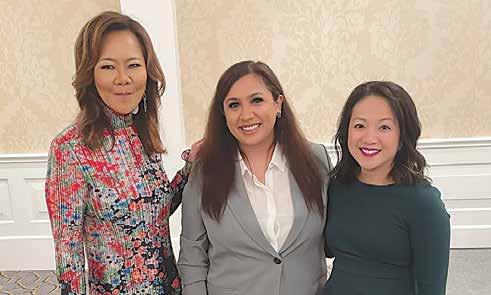
children spending it too quickly, or if your children are minors, you may consider directing the funds to be held in trust. Naming a minor child as a beneficiary could require a court appointed guardian to manage the account, which is a costly and time-consuming process. However, directing these account funds into trust has its drawbacks, including that any dis tributions retained in the trust will gen erally be taxed at the highest marginal income tax rate.
If you live past your required begin ning date of 72, your beneficiaries will be able to withdraw your account over your remaining life expectancy if that is longer than any other rule that applies.
During this season of giving, it is important to keep in mind that any portion of your account that you leave to charity will not be subject to income tax (or estate tax, if applicable). For that rea son, pre-tax retirement accounts are ideal assets to leave to charity as part of your estate plan.
Whatever your choice in beneficiary, be sure to choose wisely by making a designation that fits into your overall estate plan. And stay tuned, as the Secure Act 2.0 is anticipated to pass this year, which could change some or all of the above rules.
HN
Lora G. Davis is a Managing Member at Davis Stephenson, PLLC. She can be reached at lora@davisstephenson.com.
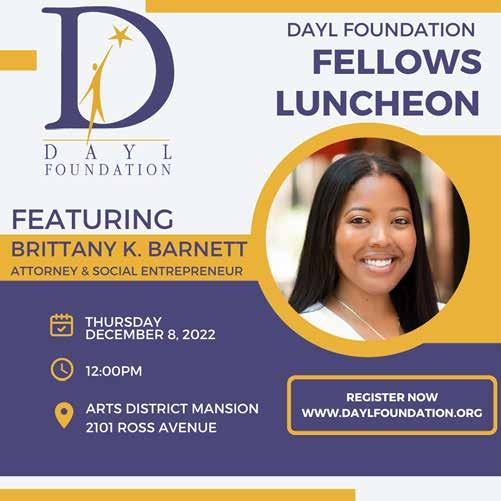

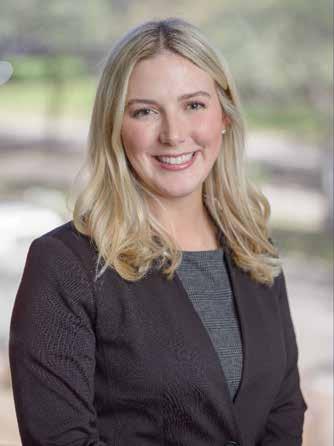
20 Headnotes l Dallas Bar Association December 2022
LORA G. DAVIS Choose Wisely - Retirement Account Beneficiary Designations Focus Probate, Trusts & Estates/Tax Law Introducing Our New Associate Sydney E. Richeson 12221 Merit Drive, Suite 200, Dallas TX 75251 (469) 916-1980 | sricheson@minceycarter.com | www.minceycarter.com Need Help? You’re Not Alone. More resources available online at www.dallasbar.org/content/peer-assistance-committee Texas Lawyers’ Assistance Program…………...(800) 343-8527 Alcoholics Anonymous…………………………...(214) 887-6699 Narcotics Anonymous…………………………….(972) 699-9306 Al Anon…………………………………………..…..(214) 363-0461 Mental Health Assoc…………………………….…(214) 828-4192 Crisis Hotline………………………………………..1-800-SUICIDE Suicide Crisis Ctr SMU.…………………………...(214) 828-1000 Metrocare Services………………………………...(214) 743-1200
BY
On November 7, the DBA hosted its first Trailblazers program with panelists (left to right): Kathleen Wu, Partner at Hunton Andrews Kurth; moderator Sadaf Abdullah, Director, IPR & Licensing, Ericsson Inc.; and Meyling Ly-Ortiz, Managing Counsel at Toyota.



December 2022 Dallas Bar Association l Headnotes 21
BY MICHAEL P. MOORE AND J. COLLIN SPRING
The constitutional bedrock of prop erty taxation in Texas is that it be fair, equal, and uniform. To realize that constitutional guarantee, Texas lawmakers empowered two governmental entities to safeguard property owners’ rights— Appraisal Districts, which value real and personal property for tax purposes, and Appraisal Review Boards which review the decisions of the Appraisal District. Texas law gives property owners specific rights to challenge their properties’ valuations and requires the government to follow specific rules and procedures that are designed to protect those rights. However, it is an unfortunate fact that not every District or Review Board is willing to play by those rules.
The failure of districts to comply with the rules, whether intention ally or unintentionally, is well-docu

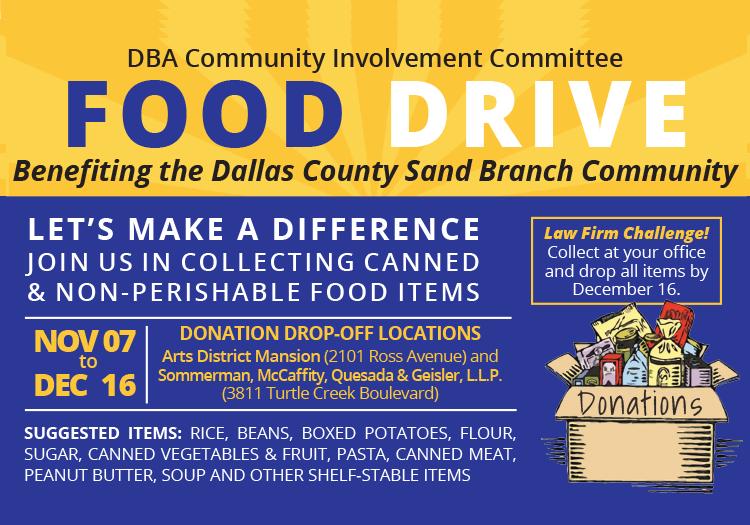

mented. In 2019, the Travis County Appraisal District improperly accessed proprietary information from a realtor group and used it in determining its assessments. In 2021, hundreds of thousands of Denton County taxpayers received appraisal notices that showed reductions that the District did not, in fact, intend to apply. Just this past August, the Tarrant Appraisal District Board of Directors suspended its Chief Appraiser pending an investigation into multiple allegations of malfea sance. While these instances are just those that made the news, they paint a vivid, albeit partial, picture of the Districts’ and Review Boards’ failure to abide by the basic requirements of the Texas Tax Code.
Noting increasing evidence of noncompliance by Districts and Review Boards, the Texas Legislature enacted Section 41A.015 of the Texas Tax Code. This statute enables property owners to request limited binding arbi


tration to compel the Districts and Review Boards to abide by the strictures of the Tax Code. An arbitrator for this process is to be selected from a registry of attorneys maintained by the Comp troller, and the arbitration fees permit ted are sharply limited—$450 or $550 depending on the type of property—to preserve the resources of the parties.
Traditionally, the Tax Code has provided very limited means by which property owners could address misconduct. In cases where proper notices are not delivered to taxpayers, Sec tion 41.411 provides the opportunity to protest and then appeal the order to a district court. When a Review Board refuses to schedule a hearing, Section 41.45(f) permits the taxpayer to bring suit to compel a hearing. And Section 41.41(a)(9) allows for protests of any action of the Chief Appraiser, the District, or the Review Board that adversely affects a property owner. In each instance, a denial of the adminis trative protest necessitates litigation— always an expensive proposition—and there is no guarantee that the property owners can recoup their attorneys’ fees, even if successful. The adoption of this limited binding arbitration pro cess is an integral step towards giving Texas taxpayers a more equitable and cost-efficient process.
While Section 41A.015 is not a panacea for all potential scenarios in which Districts and Review Boards fail to follow the Texas Tax Code, it does provide relief to property owners in instances where Districts and Review Boards (1) adopt procedures that vio late Texas law; (2) refuse to schedule a hearing on their protest; (3) refuse
to provide the information intended for use at the Review Board hearing; (4) refuse to allow the taxpayer to offer evidence, examine, or cross-examine witnesses, or present arguments at the hearing; (5) attempt to use evidence the Tax Code makes inadmissible because of nondisclosure; or (6) vio late the scheduling rules established by law. This section further empowers the arbitrator to compel compliance by the District or Review Board and to rescind orders issued in contravention of the Tax Code and applicable laws.
One caveat is that property owners must act fast to avail themselves of the new arbitration procedure. The statute requires that taxpayers give the govern ment notice within a five-day period (running from the time of the conduct complained of) as a prerequisite to using the limited binding arbitration process. After the five-day period expires, the District or Review Board has ten days to resolve the issue informally before the taxpayer can seek arbitration.
Moving toward a system that allows taxpayers to protect themselves when Appraisal Districts and Review Boards fail to abide by the Tax Code is wel come progress. After years of taxpayer complaints, the Texas Legislature has finally provided Texans the ammuni tion they need to defend their rights, moving the State one step closer to realizing the Constitution’s guarantee that the taxation of property be fair, equal, and uniform. HN
Michael P. Moore is a Partner at Ryan Law Firm, PLLC and can be contacted at michael.moore@ryanlawyers.com. J. Collin Spring is an Associate at the firm and can be contacted at jay.spring@ryanlawyers.com.
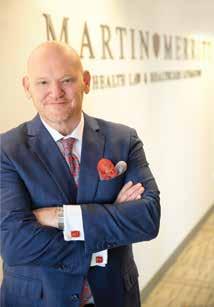
22 Headnotes l Dallas Bar Association December 2022
Texas Legislature Gives Property Owners Tools to Fight Back Focus Probate, Trusts & Estates/Tax Law Spanish for Lawyers 2023 Spring Session: January 17 - March 22, 2023 Held online via Google Meet/Video conference. Learn how to read, write, and speak Spanish at an adult continuing education level, with emphasis on legal terminology at the intermediate and advanced levels. Register online at www.dallasbar.org/spanishforlawyers MARTIN MERRITT Health Law and Healthcare Litigation “I highly recommend Martin As Co-Counsel in Healthcare Litigation Cases.” --Brad Jackson/ Commercial Litigator, Dallas • Healthcare Trials/Hearings Analysis of Illegal “kickback” contracts • Enforceability of 15.50 Non-Competes Insurance “Clawbacks” • FBI, OIG, CMS Investigations Medical License Revocations Martin Merritt Chair, DBA Health Law (2021) Ex. Dir. Texas Health Lawyers Association Martin@MartinMerritt.com Dir. (214) 952.1279 Martin Merritt is your co-counsel in healthcare litigation cases. If one side has an experienced health lawyer in their firm and you do not, you can level the playing field by associating Martin Merritt as co-counsel. You keep the client. Hourly and flat monthly rates available. Martin can try the case, prepare and argue hearings, or simply serve as health law analyst. You stay in control of the case and keep the client. Experienced. Over 30 years, in Texas and nationally, Martin Merritt litigates cases against the FBI, DEA, OIG, CMS, AUSA, TMB, Tex. OAG, Tex. Med. Bd, Pharm. Bd., TXDSHS, Civil False Claims Act Subpoenas and lawsuits, civil investigative demands, arbitration, criminal and other administrative actions. He has a proven track record applying this knowledge to win victories for business litigators. (D Mag. Best 2018, 2020, 2022)
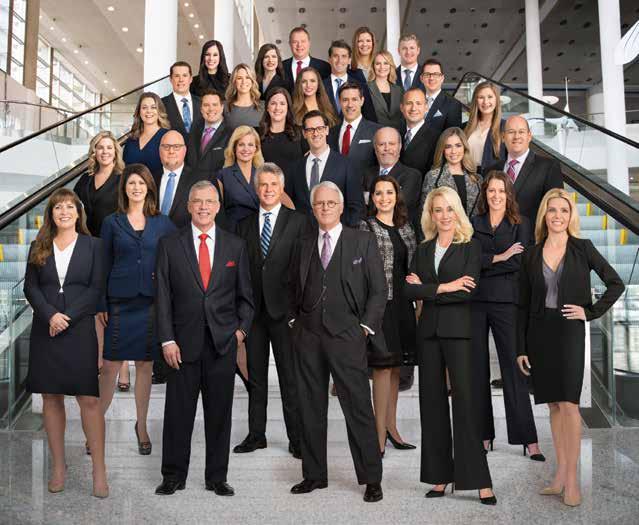
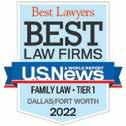
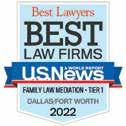
December 2022 Dallas Bar Association l Headnotes 23 D A L L AS * * | 1717 McKinne y Avenue, Suite 1500 | Dallas, Texas 75202 | 214.871.2727 D ENTO N | 320 West Eag le Drive, Suite 200 | Denton, Texas 76201 | 940.442.6677 P L A N O | 5700 W Plano Parkway, Suite 2200 | Plano, Texas 75093 | 972.769.2727 SO U TH L AK E | 550 Reser ve Street, Suite 450 | Southlake, Texas 76092 | 817.481.2710 *Board certified in family law by the Texas Board of Legal Specialization. **Principal office. K OO NS FU LL E R : DIVORCE, CHI L D CU S TOD Y , POS T D I V O R CE M O D I F IC A TIO NS , CHIL D S UPPO R T , MAR I T A L P R OPE R T Y AG R EEME N TS, ENFORCEME N TS, G RAND P A RENTS’ RIGHTS, P A TERNIT Y , CO L L A BOR A TIVE L A W , A ND A PPEA L S LEFT TO RIGHT: R1: Heather King,* Rick Robertson,* Ike Vanden Eykel,* Charla Bradshaw,* Liz Porter* R2: Jessica Janicek,* Brian Loughmiller,* Neda Garrett,* Julie Crawford* R3: Laura S. Hayes,* Sean Abeyta,* Dana Manry,* Chris Meuse,* Fred Adams,* Sally Pretorius,* Rob McEwan* R4: Jessica Perroni,* Kevin Segler,* Courtney Walker, Deron Sugg, David ompson, Laur en Shaw R5: James Logue, Lauren Harris, Lindsey Vanden Eykel, Taylor Joeckel, Paul Leopold R6: Spenser Housewright, Sarah Cary, Drew Williamson R7: Tom Daley,* Bonny Haynes, Justin Whiddon
Holidays FROM THE KOON S F U L L E R NO R TH TEXAS TEA M Happy Holidays
Happy
The Dallas Bar Foundation Announces Newly Endowed Funds
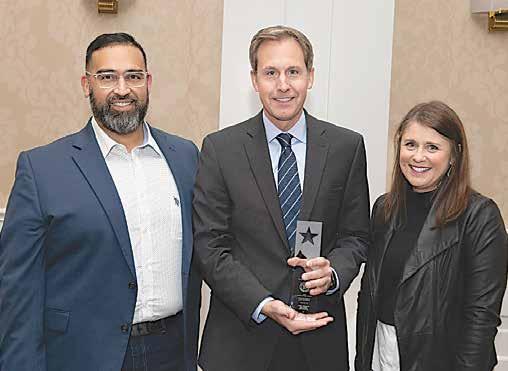
The Stephen H. Philbin II Award for Excellence in Legal Reporting has been awarded each year since 1983 one year after Steve’s passing from leuke mia at the age of 39. He was a lead ing authority on media law, advising many of the large media organizations in Texas. The cash awards presented to the winning journalists were funded annually by Steve’s family to commem orate his passion for the rights of the free press and the First Amendment. Steve was described as being at his very best when he was asked to give prepublication review to stories that obvi ously had some bite to them, some risk, as far as the reporting was concerned. He loved to work with the reporters in ironing out the problems he could spot with his expert eye to help avoid unnec essary risk but still get the essence of the story across. Steve was a graduate of Harvard Law School and received his undergraduate degree in philosophy from Yale University. He was an active member of the Dallas Bar Association.
The Dallas Bar Foundation pre sented this year’s awards at the Fel lows Luncheon held in October. Sadly, Susan Philbin, Stephen’s sister passed away last year. She always made it a point to fly to Dallas when the award was presented. She was a friend to the Dallas Bar Foundation and named the Foundation as one of the beneficiaries of her trust. Her generosity and desire to honor her brother’s legacy and his passion for the First Amendment, and the rights of a free press, will continue in perpetuity with the presentation of this annual award.

The Stephen H. Philbin II Award is open to journalists in the state of Texas and is the only such award given by a
bar association in Texas. This year’s winner was a team from NBC 5 which included Scott Freidman , Eva Parks , and Jose Garcia for their series titled “Paper Tag Nation,” which highlighted far-reaching impacts of fraudulent Texas license plates, the huge threat they pose to the public and police, and how the state agency with the power to stop the fraud enabled it instead. They shared the $12,000 first place cash award.
The second endowed fund was announced by the Dallas Bar Asso ciation Bankruptcy & Commercial Law Section with the creation and endowment of the Honorable Harlin Dewayne (“Cooter”) Hale (Ret.) Summer Fellowship on the occasion of Judge Hale’s retirement in June 2022. The Fellowship honors Judge Hale
and his immense contributions to the Bankruptcy Bar, and particularly to law students, externs, interns, clerks, and young lawyers, over the course of his career. Inside and outside of the court room, Judge Hale is a steadfast propo nent of “paying it forward” focusing not only on the law and educating the next generation of bankruptcy attorneys, but also on character, integrity, civil ity, fairness, and empathy through pro gramming and by example.
The Honorable Harlin Dewayne (“Cooter”) Hale (Ret.) Summer Fel lowship will be awarded annually to one student who will have com pleted their first or second year of law school and consists of a six-week sum mer internship with the United States Bankruptcy Court for the Northern District of Texas, Dallas Division,


rotating among the judges. The first six-week Fellowship will be awarded for the summer of 2023.
The third endowed fund established in 2022 is named the James R. Alexan der Internship. The internship will be a public service or non-profit six-week summer internship for a law student and will be awarded for the first time in 2023.
James R. Alexander practiced law in Dallas for 70 years. He was a member of the American Bar Association, the Dallas Bar Association, the State Bar of Texas, and the Dallas Estate Planning Association. James graduated from SMU in 1943 with Bachelor of Busi ness Administration and the Univer sity of Texas Law School in 1946. James passed away on November 24, 2016 in Dallas at the age of 93.
Among his volunteer and philan thropic endeavors, James exemplified lifelong membership in Sigma Alpha Mu. He was initiated into Sigma Alpha Mu at SMU (Mu Alpha Chapter) in 1941 and was active at the University of Texas (Sigma Theta Chapter) where he earned his law degree. He was the 15th recipient of Sigma Alpha Mu’s Distinguished Service Award in recog nition of more than seven decades of continuous volunteer service encour aging academic excellence, and the development of leadership skills in col legiate men.
With the addition of these two new endowed internships, the Dallas Bar Foundation, in 2023, will now be able to offer 15 internships/clerkships for law students including the Justice Baker Clerkship at The Supreme Court of Texas, the Chief Justice Carolyn Wright Internship at the Fifth District Court of Appeals, and the Bob Mow Judicial Internship at the U.S. District Court Northern District of Texas. HN


Education Law Study Group
2022 Dallas Bar Association
DEI CLE Challenge
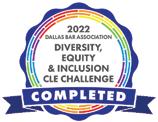
24 Headnotes l Dallas Bar Association December 2022
REPORT
STAFF
Winners of the 2022 Grand Prize Philbin Award (left to right): Jose Garcia, Scott Freidman, and Eva Parks
Does your practice entail school or education law? Would you be interested in participating in a DBA Education Law Section to connect with others in this practice area and where CLEs will be presented on education law topics? If so, email Sandy Lauro (sandra@slauro.com) who is assisting the DBA to create an Education Law Section.
DBA encourages its members to aspire to complete 3 hours of CLE training in the areas of diversity, inclusion, and equity each calendar year. The DBA will recognize members who complete and self-report their 3 hours of DEI CLE by December
2022. Programs that qualify will be identified on the DBA’s online calendar.
the Challenge to be recognized in the
Headnotes, in DBA Online, and receive your electronic DEI CLE Challenge badge. Scan to learn more and report your hours.
The
31,
Join
February 2023
John Goren Receives Kim Askew Distinguished Service Award
BY GRIFFIN S. RUBIN
The Dallas Bar Association is proud to announce John Goren as the 2022 recipient of the Kim Askew Distin guished Service Award. The Kim Askew Distinguished Service Award recognizes a DBA member who, through service to the DBA and the Dallas community, has shown a lasting dedication to good works—above and beyond the tradi tional service of DBA members—while promoting good relations among lawyers, the judiciary, and the community. It was created in 2017 and named after its inau gural recipient.
John has worked tirelessly over his distinguished career not only on behalf of his clients but for the legal profession as a whole in both the DFW Metroplex and throughout the state of Texas. As an attorney steeped in appellate law, John has fully briefed and argued the merits of cases before the Supreme Court of Texas, the Texas Court of Criminal Appeals, seven Texas courts of appeals, the Fifth Circuit, and the Federal Circuit. He has also worked on briefs before the United States Supreme Court. John was the founder of the Appellate Law Study Group of the DBA in 1989, which consti tuted the first appellate section of a local bar association in Texas. He founded the Appellate Law Section of the DBA one year later and served as its first chairman. Needless to say, John has long roots in state and federal appellate practice here in the Lone Star State.
Despite his robust appellate experi ence, John’s service to the greater legal community is just as noteworthy, if not more so. And that’s saying something considering the success John has seen in his legal career. While his roles in ser vice to the DFW legal community are too numerous to list, here are just a few
of the highlights: Secretary–Treasurer and Director of the DBA, Chair of the DBA’s Memorial & History Committee, Chair of the DBA’s Senior Lawyers Com mittee, Chair of the DBA’s Solo & Small Firm Section, Chair of the DBA’s House Committee, Chair of the DBA’s Dallas Court of Appeals Centennial Celebra tion Committee, and President as well as many terms as Director of the Plano Bar Association. As should go without saying, this sample of John’s work gives a brief overview of the impact his service has had on the legal community in Dallas.

This limited description of his service cannot convey, however, the deep sense of dedication John possesses about the work he has done. In preparing to write this article, I was fortunate to be able to sit with John to talk about his accom plishments and service to the bar. Not knowing what to expect, I was somewhat surprised about what we discussed—the
Arts District Mansion, where we were meeting for lunch. John quickly provided a much-needed education regarding the home of the Dallas Bar Association, from the time of Belo family to the 50-year stint as Sparkman Funeral Homes, to its present-day occupants. He told me of the constant renovations, reconstructions, and the like, showing just how much time and effort has gone into making the Arts District Mansion what it is today— a oneofakind meeting space for the legal community in the greater Dallas area. John has been central to this extended endeavor.
Even more notable than what John had to say was how he said it. He spoke with a passion and fervor that demon strated a continuing sentiment of a man still on a mission. John shared his whole hearted and abundant ideas for different DBA committees and further improve ments to the Arts District Mansion. No matter how much John has done, he stands ready to lead the charge forward as he has for many decades.
In addition to his long-standing commitment to the home of the DBA, John has also served almost continuously for 17 years as Chair of the Memorial & History Committee, whose mission is to gather information and write Memorial Resolutions for each member of the DBA who has passed away. This task is above and beyond the call of regular committee
membership as it requires almost daily attention, and John has been steadfast in maintaining this tradition of preserving the life and legacy of our members. The Memorial Resolutions are given to the families of all deceased DBA members, and they are always graciously received and appreciated. The Memorial Resolu tions are adopted by the membership at the DBA Annual Meeting where John always gives a moving tribute to those we have lost the past year.
John’s remarkable dedication and unique approach to public service gen erally seem to be the result of two lived experiences. First, John’s dad worked in the “rag trade” (as he likes to say), and as such, John has always kept his eye on the small details while never losing sight of the big picture, doing so with an impas sioned flair and a creative streak. Second, John comes from a long line of civically engaged citizens. Not only has his fam ily served in many publicservice roles in various organizations across generations, but they have done so with great intensity and unyielding dedication.
The Dallas legal community is so very fortunate that John has made it one of his life missions to imprint a legacy of dedi cation and devotion to service in and of our community.
HN

Griffin S. Rubin is an attorney at Sbaiti & Company PLLC and can be reached at gsr@sbaitilaw.com.
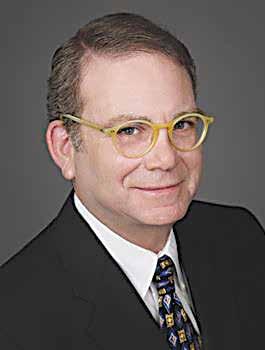
December 2022 Dallas Bar Association l Headnotes 25
NEED TO REFER A CASE? The DBA Lawyer Referral Service Can Help. Log on to www.dallasbar.org/lawyerreferralservice or call (214) 220-7444.
John Goren
BY RYAN TROBEE
The time has come for your proveup hearing. Zoom is on. Your witnesses are ready. The coffee is out of sight of the webcam. Then you receive an email or phone call from the Court telling you your hearing has been can celed. As the briefing attorney for Dal las County Probate Court Two, I see firsthand the many ways a will case can go sideways. I would like to share five common mistakes, in order of fre quency, and provide some practical tips to avoid the mistakes and a post poned hearing.
1. Is the Posted Citation Correct?
When probating wills, Texas per mits a broad type of citation, through posted notice, to invoke the Court’s jurisdiction. The Applicant and Dece dent’s names should be identical and consistent between the will, applica tion, and posted notice. Watch for spelling errors made in the will or the documents your office prepares. Put “a/k/a” or “f/k/a” depending on the cir cumstances, followed by the additional or corrected names that you need to include. Be liberal with the use of alter nate names. Frequently, lawyers obtain an order and letters testamentary for their clients, only to have third parties refuse access because the names on the order do not match an account agree ment or identification. Alias problems and spelling errors missed in the appli cation may require reposting, which
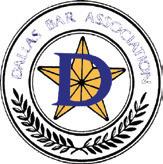
would increase your cost and delay the hearing.
2. Is Personal Citation Proper?
Routine will cases do not require service on specific parties before the prove-up. However, Chapter 258 of the Texas Estates Code requires addi tional service on the Decedent’s heirs at law and the will’s distributees in cases involving copies of wills and wills offered more than four years after a Decedent died. Before you call the docket coordinator to schedule the hearing, make a table outlining all the necessary parties, and check off how they have been served or have waived service. There is added complex ity when serving estates, trusts, and minors. Be sure you know the rules in those instances.
3. Is the Will an Original?
There are different application, proof, and service requirements when probating an original will versus a will copy. If you allege the will is an original in your application, physically inspect the will document carefully before sub mitting it to the probate clerk. Several times a week I review “original” wills which are actually copies. Telltale signs of a copy include choppy edges on signatures, ink that does not smudge, and a lack of indentation on the signatures. Discovering the will is not an original at the hearing is not ideal. Also, make sure the will is delivered to the clerk before scheduling the hearing.
4. Is the Will Self-Proved?
Before pleading a will is selfproved, be sure it actually is. Here is a list of common errors that make wills not self-proved under Texas Estates Code §251.104: (1) the affidavit does not have a notary seal, (2) there are blank lines for the names of the testa tor and/or witnesses, (3) the witnesses have not sworn to the statement (just acknowledged), and (4) the affidavit does not state the witnesses’ ages. If the Decedent died after September 1, 2011 and the will was executed outside of Texas, it is considered self-proved if the will is self-proved according to the laws of the other state at the time of execution. In that case, you need to provide the Court with an exhibit showing the relevant law for that state. A non-self-proved will is not the end of the road, but it does require addi tional testimony regarding the docu ment’s due execution.
5. Does the Will Provide for an Independent Administration?
Make sure the will indicates that the executor for whom you are seeking letters can serve independently. There

are no exact language requirements to designate an independent executor. Examples include the phrase “independent executor” or a clause that no fur ther action be taken in the estate by the probate court except the return of an inventory. Out of state wills and holographic wills are the most likely culprits to exclude this language. If you are seeking independent adminis tration and the will does not provide for it, cite the relevant statute in your application, proof, and order. Be sure to get sufficient sworn consents from all of the distributees. If there is a postdeceased distributee, only a personal representative of that distributee’s estate can consent, not the presump tive beneficiaries of that estate.
Conclusion
These issues can derail a will proveup but they are avoidable. Keep these tips in mind when filing your will application and preparing for your next hearing. And if you find yourself in Probate Court Two, be sure to see if you are eligible to take advantage of our one-minute will prove-up process. HN
Ryan Trobee is a Briefing Attorney at Dallas County Probate Court Two. He can be reached at ryan.trobee@ dallascounty.org.
26 Headnotes l Dallas Bar Association December 2022
5 Mistakes Delaying Will Prove-Ups, and How to Avoid Them Focus Probate, Trusts & Estates/Tax Law WWW.THOMASRONEYLLC.COM Personalinjury Wrongfultermination Intellectualproperty Commercialdamages/lostprofits Businessvaluations Whenyouneedanumber callournumber 817.733.6333 DAMAGES DALLAS•FORTWORTH•HOUSTON•ATLANTA Dallas Bar Association Santa Brings a Suit Sponsored by the Community Involvement Committee Friday, December 2, 2022 9:00 a.m. to 1:00 p.m. Drop o locations: Arts District Mansion (2101 Ross Avenue) Katten Muchin, Rosenman (2121 N. Pearl St., Lobby) The DBA Community Involvement Committee is collecting gently used business attire such as suits, pants, belts, purses, shirts & winter attire such as coats, sweaters, pants, socks. Benefits the Dallas Life Foundation The 2022 DBA We Lead held its Graduation on November 16, with keynote speaker Carey O’Connor, CLO of Flowserve. Thank you to class program directors Ophelia Camiña and Lisa Tomiko Blackburn. DBA We Lead Graduation
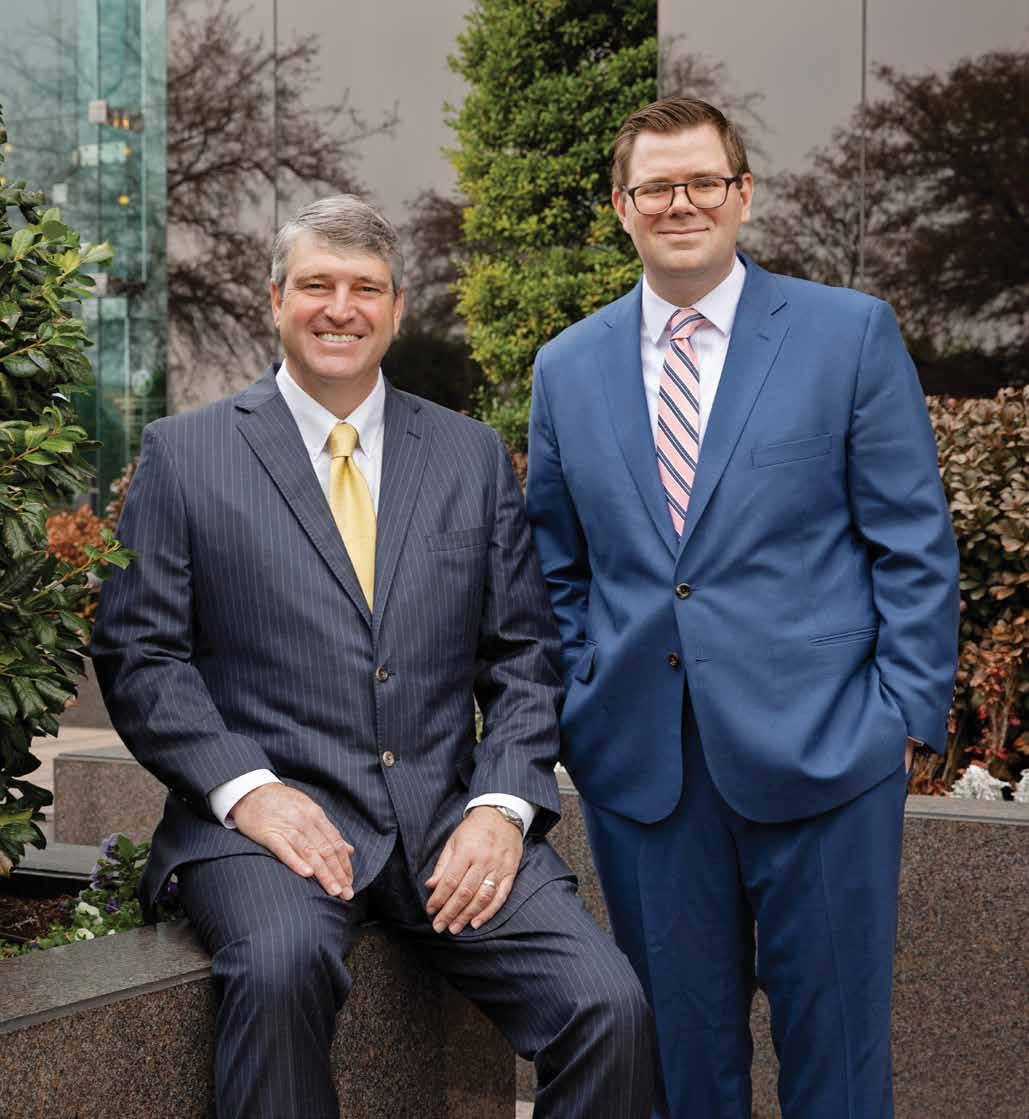

December 2022 Dallas Bar Association l Headnotes 27 Experienced Counsel Creative Solutions • Satisfied Clients Fiduciary Litigation | Will Contests and Estate Disputes | Trust Disputes Flournoy McLain, P.C. 10000 N Central Expressway, Suite 800 Dallas, Texas 75231 dallasestatelaw.com | 214.295.4777 lflournoy@dallasestatelaw.com • cmclain@dallasestatelaw.com We look forward to the opportunity to serve your family’s needs.
BY ALLAN TARLETON
Attorneys often find themselves giving personal encouragement and support for clients in challenging legal and personal circumstances, but at some point a client’s needs may be beyond the skills of the attorney.
One of the most difficult situations an attorney can face is when a client is threatening any type of self-harm. The circumstances may be so serious that the attorney believes it necessary to seek professional assistance for the client. Is there an affirmative duty to stop the client, or does confidentiality prohibit any action at all? Thankfully, the Rules of Professional Conduct permit disclosure if certain conditions are met, but that determination will be unique to each client.
If mental health concerns appear at the outset in the initial client consul tation, the attorney should be proac tive. The Rules indicate that it is pru dent for the attorney to give a client the opportunity to designate trusted persons who may be contacted by the attorney if special needs arise, and the client should be counseled about the purpose and use of such designations. If the client is already seeing a mental health professional, that professional’s contact information should also be obtained.
When authorization is not obtained in advance to discuss mental health issues regarding a client, the first hur dle in seeking professional help for a client arises in connection with resolv ing the duty of confidentiality. Under Rule 1.05 of the Texas Rules of Professional Conduct, an attorney is prohib



firm, unless the disclosure is consented to by the client, impliedly authorized, or otherwise permitted under subsections (c) or (d) of Rule 1.05. Regard less of the client’s mental state, the Rules make clear that an attorney has a duty to attempt to maintain, as far as reasonably possible, a normal clientattorney relationship with the client, and this includes normal communica tion with the client.
Accordingly, the attorney should first attempt to obtain the client’s consent to any disclosure of informa tion when seeking professional men tal health services for the client. An attorney unfortunately may become aware of a client’s ideations or plans for self-harm in some manner that does not allow the attorney to speak with the client and obtain the client’s consent--such as an email or text; If the attorney does attempt to contact the client it may be impossible, due to the client’s mental state, to persuade the client to have any dialogue around confidentiality and disclosures - the client may simply refuse to answer the phone or respond to other communi cations.
The Rules provide options when client consent is not obtained. Under Rule 1.05(c)(10), an attorney may reveal confidential information about a client when the attorney has reason to believe it is necessary to do so to prevent the client from dying by sui cide. Rule 1.16 also provides that an attorney may take reasonably neces sary protective action when the client has diminished capacity, is at risk of substantial physical, financial, or per sonal harm without action, and the
In both scenarios, the Rules permit disclosures but do not require them. And the Rules only allow disclosure when the attorney has a “reason to believe” or a “reasonable belief” that the disclosure is necessary to prevent suicide or substantial harm. To form this reasonable belief, the attorney must make a very difficult judgment call about the client’s mental state— one that may make the client resent the attorney or put the client at risk of mental health commitment.
The Restatement (3d) of the Law Governing Attorneys recognizes sev eral factors to consider in forming a reasonable belief of certain death or substantial bodily harm, including:
• The degree or likelihood of harm without disclosure;
• The irreversibility of the conse quences;
• The attorney’s prior dealings with the client; and

• The extent of adverse effects on the client caused by the disclosure.
In assessing such risk, the attorney should consider whether the client has ideation only or an actual plan to cause immediate harm. If there is a plan, the attorney should consider whether the client has the means to carry out that plan and if the plan is likely to result in substantial harm or death.
In addition to counseling the client to get help and avoid taking
any harmful actions, the lawyer may determine that outside help is needed, such as family, support groups, crisis hotlines, or adult protective agen cies. The disclosure of information to these types of help resources should be limited to the amount necessary to obtain the least restrictive help that is reasonably necessary. Resources also include advising a client to dial 988 for the suicide or crisis lifeline. Attorneys should have the contact information for a local mobile crisis unit (check out herefortexas.com/gethelp-now) who can reach out directly to assist a client.
You may be faced with using your best judgment under critical time constraints, particularly if a client expresses an intent to act quickly. A delicate response can be important in aiding the client to act calmly. For example, if dialing 911, make sure to ask first responders to act with discre tion and avoid coming in with sirens blaring, as this may only heighten the stress of an individual contemplating self-harm or suicide.
If you find yourself in one of these difficult situations and are unsure of your options, please consider contact ing the State Bar ethics hotline for advice. HN
Allan Tarleton, of Tarleton + Boswell, PLLC, can be reached at allan@tarletonboswell.com.
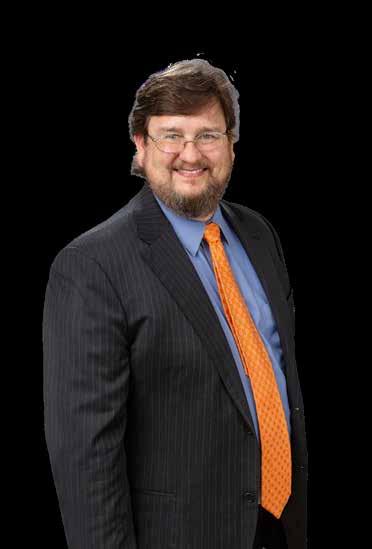
28 Headnotes l Dallas Bar Association December 2022
a Client in Crisis
Helping
Farrow-Gillespie Heath Wilmoth LLP A certified woman-owned law firm · fghwlaw.com Same extensive legal services. Same award-winning attorneys. New “W” in our name. Chris Wilmoth Former Statutory Probate Judge Probate | Guardianship | Trusts — Administration and Litigation Estate Planning | Trademark | Commercial Real Estate Employment | Business Transactions and Litigation Congratulations, Debra Witter, on your retirement! Welcome, Chris Wilmoth, to the ranks of named partner! End of the Year Ethics Roundup T h u r s d a y , D e c e m b e r 8 , N o o n , v i a Z o o m E t h i c s 1 . 0 0 Speakers include: Jerry Hall, Campbell & Associates Law Firm, P.C. "What to do When Your Corporate Client is Engaging in Questionable Conduct?" Professor Fred Moss, SMU Dedman School of Law, Ret "An Overview of How the Rules Have Changed" Ken Rubenstein, Kenneth J. Rubenstein, P.C. "Ethical Mediation" More information at dallasbar.org Sponsored by the DBA Legal Ethics Committee



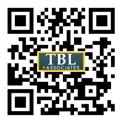



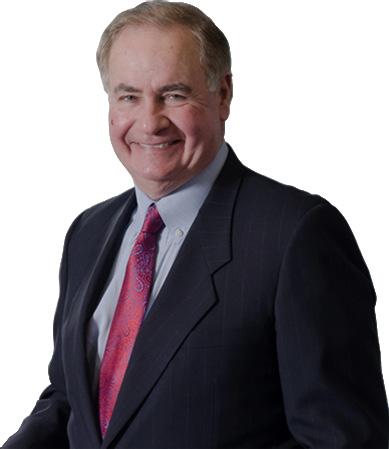
December 2022 Dallas Bar Association l Headnotes 29
BY GREG SAMPSON AND CLEVE CLINTON
Unanticipated changes in the law or circumstances may derail a careful plan to preserve a client’s intent to transfer wealth through trusts.

A “trust protector” originated from a need to protect offshore trusts from unchecked foreign trustees in unfriendly jurisdictions. Many planners now view it as an elixir to cure all unknown ills and as a staple in many planner’s forms for all planning.
We recently examined several different “train wreck” trusts—each with different protector concerns. Each was set on a course to destroy the grantor’s express plans; more over, they all raised serious ethical questions and even possible fiduciary breaches by the planner or protector. Thus, our current top five warnings:

1. Not You. Naming the drafting attor
ney as protector likely violates our conflictof-interest rules of professional responsibil ity—between the client and their attorney (see Rule 1.08). A protector who benefits from compensation, broad powers and a broadly written exculpatory clause—and is also the drafter—appears to be in direct conflict with his or her client’s best interest. Moreover, the professional rules essentially prohibit the client’s waiver of such a conflict without independent counsel. Self-appointment also violates the fiduciary duty of loy alty and duty to provide representation only for the client’s best interest. In short, do not do it.
2. If Not You, Then Who? Protector selection and succession is crucial—impar tiality and independence are mandatory. Many protector powers we have seen essentially usurp the Trustee’s powers or otherwise leave the trustee impotent. Proper initial
selection of a trustee overcomes the neces sity to override or micromanage that trustee. Consider whether removing liability protec tions for the trustee and granting the protector only the powers to remove and replace the trustee solves the bulk of any likely prob lem.
3. Beware of Overbroad Powers. The boundaries of a protector’s powers are not defined by case law; thus, locating the bound aries of enforceable powers is a bit of a wild west. Yet, clearly in Texas, a protector acts as a fiduciary unless the protector’s powers are limited to removing and replacing a trustee, as provided in Trust Code §114.0031. Trust amendment powers we have seen attempt to redraw power boundaries far beyond appropriate adjustments for scrivener errors, changes in tax law, situs or controlling law or qualifying as a special needs trust or like benefits in favor of a beneficiary. Know this: protector granted powers beyond remov ing or appointing a successor trustee will be judged on a fiduciary standard much like a trustee’s actions.

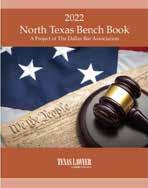
restrictions can properly be relieved is open for debate and speculation. Surely even these “safe harbor” notions do not permit enforcement of planner/protector inserted trust pro visions attempting to insulate the protector. Disturbingly, we have seen provisions requir ing proof of clear and convincing evidence of bad faith acts, gross negligence, or inten tional misconduct, requiring the trust to pay all protector defense costs, and providing blanket indemnification of the protector.
Hon. Dianne Kathryn Jones, County Court at Law #4


4. Avoid Over-Exculpation. Capable trustees may require broad limited liability provisions; however, blanket protections and added burdens of proof only encourage abuses of power. The Trust Code §114.007 invali dates trust provisions attempting to relieve a trustee’s liability for bad faith breaches— intentionally or with reckless indifference to the beneficiary’s interest. Moreover, lan guage attempting to relieve abuse of a fidu ciary duty liability or liability arising from a lawyer’s confidential relationship with the settlor are ineffective. Yet, §114.007(c) sug gests that a trustee may, under the trust terms, be relieved from some trust duties or restric tions; however, §114.007(c) is subject to §111.0035. With no definitive case law, the statutory suggestion that some trust duties or
5. Consider the Grantor’s Intentions Not all trusts need trust protectors. Alterna tives should be considered, such as allowing beneficiaries to remove and replace trustees with independent trustees. Powers to amend should be strictly limited to necessities for the trust to operate as intended and perhaps require the consent of the Trustee or others affected by the change. Granting unlimited use of trust funds to defend a protector is ill-advised, as it provides little deterrent to abuse by the protector, and financially penal izes the beneficiaries who seek to end the abuse. Also, one should anticipate how to avoid contests and litigation over the mean ing of protector terms.
As a final note, because protector pro visions can have grave consequences to the grantor’s plan and liability for the fiduciaries and planner, they should be used judiciously and sparingly. The grantor must know poten tial abuses and measures to keep all fiducia ries in check when deciding what to include in the final documents. The planner, in the face of underdeveloped statutory restrictions on abuse, must provide those protections through careful drafting. HN
Kelly decided to supplement his experience in the cockpit with experience in the courtroom and enrolled in Southern Methodist University’s Dedman School of Law. While in law school, he served members of the Dallas community through the Van Sickle Family Law Clinic, and as an intern for the Federal Public Defender’s Office and the Collin and Dallas

30 Headnotes l Dallas Bar Association December 2022
Greg Sampson is Senior Counsel at Gray Reed and is Board Certified in Estate Planning and Probate Law. Cleve Clinton, Partner at the firm, is Board Certified in Civil Trial. They can be reached at gsampson@ grayreed.com and cclinton@grayreed.com, respectively.
Five Hazards to Avoid in Appointing a Trust Protector Focus Probate, Trusts & Estates/Tax Law There is no better way to prepare for trial than to research your judge through Texas Lawyer’s Bench Book Series! Two Texas Regions. Two Must-Have Bench Books. There is no better way to prepare for trial than to research your judge through Texas Lawyer’s Bench Book Series! Two Texas Regions. Two Must-Have Bench Books. www.TexasLawyerBooks.com Call 800-756-8993 or shop online to order your county’s Bench Book today! Harris County Bench Book A Joint Project of the Houston Young Lawyers Association and Houston Bar Association 2022 Book_Cover.indd
CARTER Always aspiring to serve his community in the highest capacity
KELLY A.
possible, Kelly A. Carter began his public service career when he earned a commission in the United States Air Force. He served the nation as a B-1B Weapon Systems Officer, flying over 100 combat missions.
District
Attorney’s Office where he
Kelly
his
those
modest
access to
ECL
to assist Kelly in his
to serve the
Spotlight ECL You are Invited to the Judicial Investitures of:
County
Attorney’s Offices. After graduation, Kelly joined the Rockwall County District
gained significant trial and legal experience. In 2022,
launched
own law practice with the goal to provide all people, especially
of
means,
affordable, high-quality, and complete justice.
is proud
efforts
community. Attorney
Hon. Maria Aceves, 192nd District Court Hon. Veretta Frazier, 44th District Court
Friday, January 6, 3:30 p.m. at the Arts District Mansion
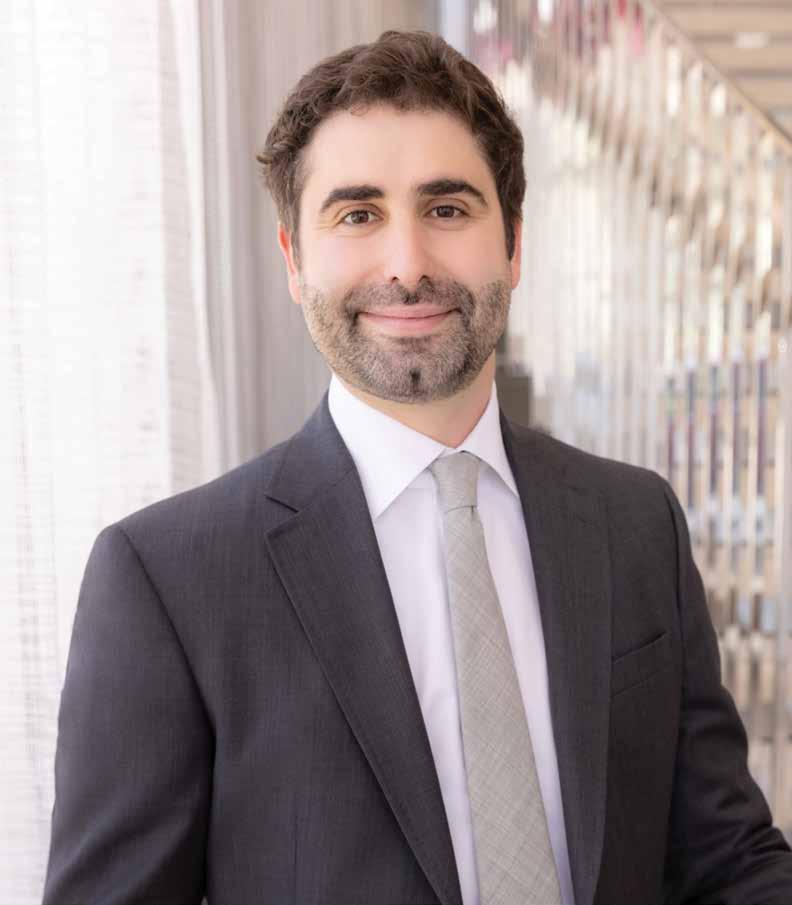
December 2022 Dallas Bar Association l Headnotes 31 DALLAS | COLLIN | DENTON | TARRANT | PARK CITIES | PRESTON HOLLOW 214.939.3000| CALABRESE BUDNER.COM A MODERN APPROACH TO FAMILY MATTERS ® Strategy-focused and driven, Lee Budner deploys his
big firm
litigation experience to excel in high-stakes divorces with millions in controversy. He also possesses the emotional intelligence necessary to effectively handle highly sensitive and contentious custody battles. Lee and his team of litigators handle cases large and small intent on working tenaciously to drive home successful results for their clients. Staying “above the fray”, Lee endeavors to bring integrity and professionalism to the practice of family law. Lee combines sophistication and big firm training with the firm’s Emotionally Intelligent Divorce® services, while at the same time understanding when a client’s interests are best served with tenacity and a relentless advocate in the courtroom. At Calabrese Budner, we deliver first-class service to our clients, an emphasis on strategic thinking over reactivity, and a level of preparation and professionalism that you do not typically see in family court. -Lee Budner CALABRESE BUDNER.COM BETTER STRATEGY. BETTER DIVORCE.
former
commercial
Tanner Hartnett Named Pro Bono Lawyer of the Year
At the Annual Pro Bono Awards pro gram on October 28, the Dallas office of Hunton Andrews Kurth LLP was recog nized as Pro Bono Law Firm of the Year
Each year, the Dallas Volunteer Attor ney Program (DVAP), a joint project of the Dallas Bar Association and Legal Aid of NorthWest Texas, honors the lawyers, judges, and other legal professionals who donate pro bono legal services.
At Hunton Andrews Kurth LLP, the commitment to providing pro bono services has been a tradition since its founding in 1901 and remains a core value today. In addition to its attorneys taking pro bono cases, Hunton Andrews Kurth also teamed up with DVAP to ensure those in need in the Dallas com munity had more access to legal resources by launching the organization’s virtual legal aid intake clinic platform. Since the platform’s
inception, lawyers from Hunton Andrews Kurth have staffed and conducted more than 20 virtual legal clin ics. The firm continues to be wonderful with their support of the DVAP virtual clinics, as well as the eviction clinics.



Hunton Andrews Kurth is proud of its community service and leadership among law firms in the United States, where the firm’s tradition of pro bono service is well recognized. At the end of the firm’s fiscal year on March 31, 2021, the firm had donated more than 58,000 pro bono hours to underserved communities.
Lawyer of the Year
Tanner Hartnett, a Partner at the Hart nett Law Firm, was named Pro Bono Lawyer of the Year Ms. Hartnett has provided 117 hours of pro bono service to DVAP this year.
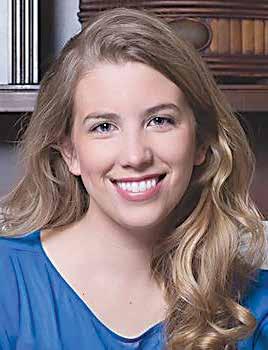
“Tanner is our most dedicated volun teer attorney who takes probate cases,” said
Michelle Alden, Director of DVAP. “Since the pandemic, we have seen a significant increase in probate cases, and Tanner is often the volun teer who steps up to take these cases.
Her exceptional pro bono work is not limited to this past year either—she has been showing up consis tently to lend a helping hand to DVAP cli ents for several years. We so appreciate Tanner and all that she does to provide access to justice for our low-income neighbors!”
Taking her first pro bono case just weeks after passing the bar exam in 2013, Tanner says that she enjoys giving back to the com munity, but with a full-time job and three children, it can be hard to find time. She stated that DVAP allows her to continue to serve individuals who are trying to do right by their families, and it is important to her to provide them the opportunity to do that.
“DVAP has gotten me into the court room, introduced me to some exception ally skilled lawyers and mentors, and given me an opportunity to give back to my community. I look forward to continu-
ing my work with DVAP for several more years to come!” said Tanner.
DVAP and the DBA congratulate Hunton Andrews Kurth and Tanner Hartnett! Thank you for all you do for Pro Bono! HN

32 Headnotes l Dallas Bar Association December 2022
Hunton Andrews Kurth LLP Named Pro Bono Law Firm of the Year STAFF REPORT 2022 Pro Bono Awards Lawyer of the Year Tanner Hartnett The Hartnett Law Firm Law Firm of the Year Hunton Andrews Kurth LLP Hartman Judicial Pro Bono Service Award Hon. David Lopez Pro Bono Appreciation Award Krisi Kastl Kastl Law Ken Fuller Outstanding Mentor Attorney Award Alisa Richman The Richman Law Firm Outstanding Support Volunteer of the Year Valerie Hollingsworth Hunton Andrews Kurth LLP Outstanding Community Partner The Senior Source Outstanding Corporate Pro Bono Coordinator of the Year Wendy Wilkerson Texas Instruments Outstanding Pro Bono Coordinator of the Year David Taubenfeld Haynes and Boone, LLP Outstanding Sole Practitioner Sharon Campbell Outstanding Eviction Clinic Attorney Jake Torres Vinson & Elkins LLP Outstanding Virtual Clinic Sponsor Haynes and Boone, LLP Outstanding Virtual Clinic Attorneys Ted Huffman and Charles Truslow Hunton Andrews Kurth LLP Outstanding Virtual Veterans Clinic Sponsor Outstanding Law School Coordinator Laura Burstein SMU Dedman School of Law Gold Award for Pro Bono Service Perkins Coie LLP Weil Gotshal & Manges LLP Holland & Knight LLP Silver Award for Pro Bono Service Kirkland & Ellis LLP Baker Botts LLP Bronze Award for Pro Bono Service Cozen O’Connor Sidley Austin LLP The Dallas-Fort Worth Lexus Dealers Ticket to Drive Raffle Winner receives a 2023 Lexus NX 250* Raffle tickets are $100 each - or 6 tickets for $500. Proceeds benefit the Dallas Volunteer Attorney Program, which provides legal services to the less fortunate in our community. No more than 1,500 tickets will be sold. Runner-up receives: A choice of America’s Cup Yacht Sailing in San Francisco, a Biltmore Estate Trip, or a Cabo San Lucas Ocean View Getaway. *Picture shown is not exact winning vehicle Purchase raffle tickets online at www.dallasbar.org/dvapraffle Drawing will be held at the DBA Inaugural celebration on February 11, 2023 The winner need not be present to win. The winner is responsible for all taxes, title and licensing. Prize is non-transferable. No cash option is available. December Friday Clinic Friday, December 9, Noon, via Zoom Lawyer Mental Health and Challenges and Strategies for the Holidays," Michelle Fontenot and John McShane Ethics 1 50 Log on to www dallasbar org for details Co sponsored by the CLE & Peer Assistance Committees
F o r a s s i s t a n c e , c a l l ( 3 1 2 ) 9 8 8 6 1 1 2 A B A P U B L I C A T I O N D I S C O U N T F O R D B A M E M B E R S Dallas Bar members can purchase ABA books at a 15% discounted rate For a complete list of titles or to place an order, visit www ababooks org Enter code “PAB7EDBA” upon checkout and the 15% discount will be automatically applied to your order Discount does not apply to ABA CLE iPod products
Tanner Hartnett

December 2022 Dallas Bar Association l Headnotes 33
Constitutional Limits of Punitive Damages Awards
 BY GINO ROSSINI
BY GINO ROSSINI
Texas-sized punitive damages find ings have grabbed the headlines, recently including $7 billion against Spectrum (Charter Communications) and $45.2 million against Alex Jones. This article provides an overview of the constitutional limits of punitive damages awards to aid the practitioner in obtaining, defending, keeping, or overturning an award. It does not address any particular case, whether punitive damages are authorized for a particular cause of action, or any statu tory considerations, including those in the Texas Damages Act, when awarding punitive damages.
In 1996, the U.S. Supreme Court in BMW of North America, Inc. v. Gore pro vided three standards, or “guideposts,” that should be used when determining whether the size of a punitive damages award violates a defendant’s substantive due process rights: (1) the reprehensibil ity of the defendant’s conduct; (2) the ratio of punitive damages to the actual
harm inflicted on the plaintiff; and (3) the comparability of punitive damages and other civil or criminal penalties that could be imposed for comparable misconduct.
(1) Reprehensibility. This is perhaps the most important guidepost, and is measured based upon the following five, nonexclusive factors:
1. Whether the harm caused was physi cal as opposed to economic. The degree of harm suffered may also be considered.
2. Whether the tortious conduct dem onstrated an indifference to or a reck less disregard for the health or safety of others.
3. Whether the target of the conduct was financially vulnerable.

4. Whether the conduct involved repeated actions or was an isolated incident. Repeated conduct known or suspected to be unlawful is more rep rehensible.
5. Whether the harm was the result of intentional malice, trickery, or deceit,
or of mere accident. Evidence of delib erate false statements, acts of affirma tive misconduct, or concealment of evidence of improper motive may also be relevant.
The existence of any one of these factors may not be sufficient to sustain a punitive damages award; the more fac tors that the evidence supports, the more likely it is that an award will be upheld.
(2) Ratio. This guidepost consid ers the ratio of the punitive damages to the actual harm inflicted on, or that was likely to result to, the plaintiff, usually but not necessarily measured in terms of the actual damages award. Courts reject a simple mathematical formula for deter mining an appropriate or excessive ratio. Correlation to the number of reprehensi bility factors present, whether the actual damages suffered were nominal or sub stantial, and any particularly egregious characteristics of the defendant’s behav ior should be considered.
Courts have signaled that, in prac tice, few awards exceeding a single-digit ratio between punitive and compensatory damages will satisfy due process. By way of guidance, a ratio of 4.41:1 has been upheld with two reprehensibility factors and evidence of egregious conduct pres ent. A higher ratio may be supported with lower actual damages resulting from a par ticularly egregious act, and a lessor ratio may be appropriate with larger compensa tory damages. Review must be based upon a case-specific inquiry of the defendant’s conduct and the harm to plaintiff.
(3) Comparability. This guidepost compares the size of the punitive damages award and the civil or criminal penalties that could be imposed for comparable mis conduct, allowing the court to give defer ence to legislative judgments concerning appropriate sanctions for the conduct at issue. Personal injury and wrongful death,
however, do not readily lend themselves to a comparison with statutory penalties. In Owens-Corning Fiberglas Corp. v. Malone, the Texas Supreme Court framed the relevant question in such cases as whether the defendant, an asbestos manufacturer/ supplier, had reasonable notice at the time that its failure to provide the warnings at issue could result in substantial punish ment in the form of punitive damages.
Adequate evidentiary support for a punitive damages award. Before the U.S. Supreme Court addressed constitu tional limits of punitive awards, the Texas Supreme Court separately held that a punitive damages award must be reason ably proportional to actual damages. The following factors enumerated in Alamo National Bank v. Kraus provide a frame work for analysis under a factual sufficiency review: (1) the nature of the wrong, (2) the character of the conduct involved, (3) the degree of culpability of the wrong doer, (4) the situation and sensibilities of the parties concerned, and (5) the extent to which such conduct offends a public sense of justice and propriety. These fac tors are used in Texas Pattern Jury Charge 28.7. 29.7, 30.4, 85.3 and 115.38.
Determination of the excessiveness of damages as a factual matter in Texas is final in the courts of appeals. The constitutionality of exemplary damages (discussed above) is a legal question the Texas Supreme Court may review. The Court also has jurisdiction to determine whether the courts of appeals reviewed factual inquiries under the proper frame work. To facilitate this review, courts of appeals must explain why the evidence does or does not support the exemplary damages amount considering each of the Kraus factors. HN
Rossini is a Partner at Thompson, Coe, Cousins & Irons, LLP. He can be reached at grossini@thompsoncoe.com

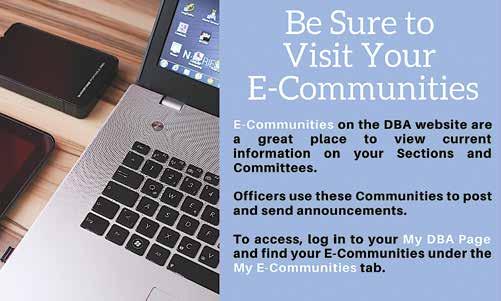


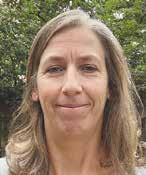
DVAP’s Finest
JOANNA L. GROSSMAN
How did you first get involved in pro bono?
I have been a law professor for 24 years and always written a lot of pro bono amicus briefs in areas related to my research and teaching. It wasn’t until I moved to Dallas in 2016 that I started to get involved in pro bono representation of indi vidual clients. It is an honor and a privilege to be able to use my skills to help people with legal problems.

What types of cases have you accepted?

I have accepted cases from DVAP involving divorce, parental rights and custody, estate plan ning, probate, and affidavits of heirship. From other sources, I have also worked on cases involving the emancipation of minors, paternity and child support, and non-parent custody challenges.
Describe your most compelling pro bono case.
I find many of them compelling because even when doing a relatively simple case, you get a window into people’s lives, which are often complicated. I did one case recently for a 30-year-old woman who had taken in her two teenage half-sisters when their mother died of Covid. We were able to establish her as the sole managing conservator for the two girls and give them some security as a legally recognized family.
Why do you do pro bono?
As the saying goes, with great privilege comes great responsibility. There are many inequities in our society, and access to justice is no exception. Lawyers have a duty to help people with out the means to hire lawyers. But I benefit as much from the experience as the clients do. I love getting to meet new people, learn about their lives, and figure out how to help them.
What impact has pro bono service had on your career?
Pro bono service has helped me learn more about how the law works in practice, which is an oft-neglected part of legal education. I’m a better classroom teacher because of my casework, and I have been able to get my students involved in pro bono cases, which helps instill in them the value of public service.
34 Headnotes l Dallas Bar Association December 2022
Gino
Pro Bono: It’s Like Billable Hours for Your Soul.
volunteer or make a donation, call 214/748-1234, x2243.
To
Joanna L. Grossman is the Ellen K. Solender Endowed Chair in Women and the Law at the SMU Ded man School of Law.
DBA TRIAL SKILLS SECTION PRESENTS Masters of Trial ARTS DISTRICT MANSION Fri, Jan. 20 2101 Ross Avenue, Dallas, TX DallasBar.org REGISTER HERE Elite trial lawyers in Dallas will demonstrate how to try a civil case before a jury. 9:00 AM - 5:00 PM MCLE: 7.00 DBA TRIAL SKILLS SECTION PRESENTS Masters of Trial ARTS DISTRICT MANSION Wed, Nov. 2 2101 Ross Avenue, Dallas, TX DallasBar.org REGISTER HERE Elite trial lawyers in Dallas will demonstrate how to try a civil case before a jury. 9:00 AM - 5:00 PM MCLE: 7.00 Crain Brogdon LLP Sommerman, McCaffity, Quesada & Geisler, L.L.P. Stafford Moore, PLLC Barnes & Thornburg LLP Hon. Irma Ramirez U.S. District Court Northern District, Magistrate Judge Kacy Miller CourtroomLogic Consulting MEMBER FEE: $50 DBA TRIAL SKILLS SECTION PRESENTS Masters of Trial ARTS DISTRICT MANSION Wed, Nov. 2 2101 Ross Avenue, Dallas, TX DallasBar.org REGISTER HERE
9:00
PM MCLE:
DBA TRIAL SKILLS SECTION PRESENTS Masters of Trial ARTS DISTRICT MANSION Wed, Nov. 2 2101 Ross Avenue, Dallas, TX DallasBar.org REGISTER HERE Elite trial lawyers in Dallas will demonstrate how to try a civil case before a jury. 9:00 AM - 5:00 PM MCLE: 7.00 Quentin Brogdon Crain Brogdon LLP Laura Geisler Sommerman, McCaffity, Quesada & Geisler, L.L.P. Paul Stafford Stafford Moore, PLLC Victor Vital Barnes & Thornburg LLP Hon. Irma Ramirez U.S. District Court Northern District, Magistrate Judge Kacy Miller CourtroomLogic Consulting MEMBER FEE: $50 DBA TRIAL SKILLS SECTION PRESENTS Masters of Trial ARTS DISTRICT MANSION Wed, Nov. 2 2101 Ross Avenue, Dallas, TX DallasBar.org REGISTER HERE Elite trial lawyers in Dallas will demonstrate how to try a civil case
a jury. 9:00 AM
5:00 PM MCLE: 7.00 DBA TRIAL SKILLS SECTION PRESENTS Masters of Trial ARTS DISTRICT MANSION Wed, Nov. 2 2101 Ross Avenue, Dallas, TX DallasBar.org REGISTER HERE Elite trial lawyers in Dallas will demonstrate how to try a civil case before a jury. 9:00 AM - 5:00 PM MCLE: 7.00 Quentin Brogdon Crain Brogdon LLP Laura Geisler Sommerman, McCaffity, Quesada & Geisler, L.L.P. Paul Stafford Stafford Moore, PLLC Victor Vital Barnes & Thornburg LLP Hon. Irma Ramirez U.S. District Court Northern District, Magistrate Judge Kacy Miller CourtroomLogic Consulting MEMBER FEE: $50 DBA TRIAL SKILLS SECTION PRESENTS Masters of Trial ARTS DISTRICT MANSION Wed, Nov. 2 2101 Ross Avenue, Dallas, TX DallasBar.org REGISTER HERE Elite trial lawyers in Dallas will demonstrate how to try a civil case before a jury. 9:00 AM - 5:00 PM MCLE: 7.00 DBA TRIAL SKILLS SECTION PRESENTS Masters of Trial ARTS DISTRICT MANSION Wed, Nov. 2 2101 Ross Avenue, Dallas, TX DallasBar.org REGISTER HERE Elite trial lawyers in Dallas will demonstrate how to try a civil case before a jury. 9:00 AM - 5:00 PM MCLE: 7.00 Quentin Brogdon Crain Brogdon LLP Laura Geisler Sommerman, McCaffity, Quesada & Geisler, L.L.P. Paul Stafford Stafford Moore, PLLC Victor Vital Barnes & Thornburg LLP Hon. Irma Ramirez U.S. District Court Northern District, Magistrate Judge Kacy Miller CourtroomLogic Consulting MEMBER FEE: $50 Register at DallasBar.org
Elite trial lawyers in Dallas will demonstrate how to try a civil case before a jury.
AM - 5:00
7.00
before
-
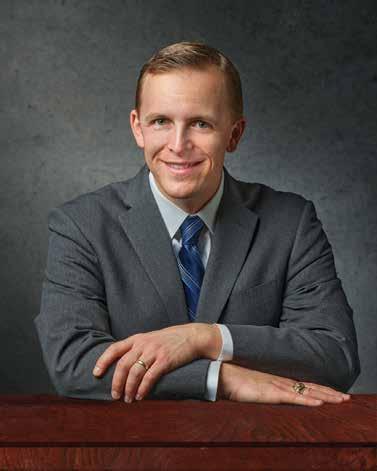
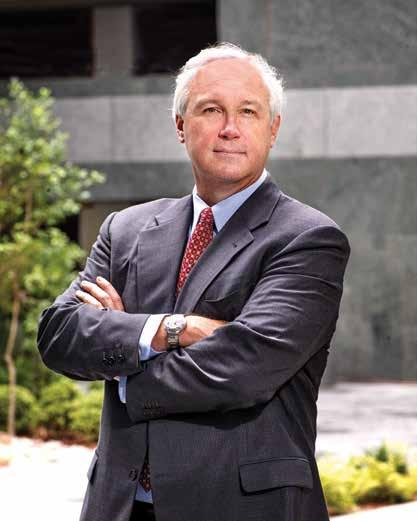








December 2022 Dallas Bar Association l Headnotes 35
How Lawyers Get Paid
BY NICOLE BLACK
One of the top business struggles lawyers face is getting paid. Law firm profitability depends on receiving prompt payment from clients. Clients who fail to pay their legal bills can be incredibly frustrating, especially as you are working toward closing your books for the year. After working hard on their behalf, you expect to be com pensated for your efforts. However, if your firm does not provide clients with multiple payment options, your firm is likely struggling to collect the legal fees owed.
Clients avoid paying legal bills for any number of reasons. Some may not have sufficient funds, and other times they may require more payment flexibility, or a more convenient way to render payment. Today’s legal clients expect to have many payment options available, and if your firm does not provide them with a choice, they will likely have difficulty paying legal bills.
That is why offering your clients mul tiple payment options, including credit cards, is one of the keys to your firm’s financial success.
When the technology used by your firm provides clients with payment convenience and flexibility, lawyers in your firm can spend time focusing on representing clients and less time try ing to collect outstanding legal fees. The result is increased profitability.
Law Firm Revenue During the Pandemic
Law firms, like most businesses, were negatively impacted by the pandemic’s effects. We observed a significant dip in payments volume in the spring of 2020, at the onset of the pandemic. However, law firm payments revenue gradually increased throughout 2021, with a full recovery toward the end of the year. In 2022, growth exceeded prepandemic heights and showed no slow ing. In other words, all signs point to a
full recovery. That’s great news for legal professionals!
Collection Rates for Legal Professionals Using Online Payments
In the age of Venmo, PayPal, and Square, your clients expect the conve nience of paying for goods and services online. Writing checks is outdated, and clients prefer to avoid the hassle of com ing into an office to pay in person.
Our data shows the amounts collected by customers who used online payments in 2021 compared to those collected by custom ers who do not yet collect online payments. Notably, the collection rates for customers who accepted online payments were nearly 10 percent higher than those who did not.
Payment Timeframes
Streamlined billing practices are one of the cornerstones of a successful law firm. More likely than not, you know how impor tant it is and have taken steps to reduce inefficiencies in your law firm’s billing pro cesses, but you know that you could—and should—be doing more.
One of the best ways to streamline a billing process is to provide clients multiple ways to pay invoices. When you provide your clients with flexibility, including the ability to pay by credit card and ACH, your firm will get paid much more quickly.
How much faster? According to 2021 data, customers who accepted online pay ments received them 32 percent faster than

those who relied on traditional methods.
Billable Rates by Practice

Area & Region
Another way to increase profitabil ity is by charging more for your services. Frequently, lawyers do not always deter mine the appropriate value for their ser vices or fail to adjust rates to keep up with changing economic times. Getting stuck in a billable rate rut is all too common and happens even to the best of us, partly because it is difficult to determine what other lawyers in your area are charging for similar services.
That is where doing your research comes in! By asking colleagues, mentors, and other legal professionals in your area how much they charge, you can compare your law firm’s billable rates for different types of cases with other legal profession als in your geographic region who handle similar cases. If your practice area is in high demand, you might even be able to raise your rates higher to accommodate demand.
Conclusion
Your law firm needs to focus on its bottom line to succeed in a competitive market, especially as the end of the year nears. Fortunately, there are technologies available that make it possible to stream line your firm’s billing and payment pro cesses and increase profits. HN
Content originally written by Nicole Black, Legal Technology Evangelist for MyCase.
D B A H O M E P R O J E C T
m o r e i n f o r m a t i o n , l o g o n t o w w w f a c e b o o k c o m / D B A H o m e P r o j e c t o r c o n t a c t D a v i d F i s k ( d f i s k @ k r c l c o m ) o r M i k e B i e l b y ( m b i e l b y @ v e l a w c o m ) M a k e c h e c k s p a y a b l e t o D a l l a s A r e a H a b i t a t f o r H u m a n i t y a n d m a i l t o : c / o A r a c e l i R o d r i g u e z D a l l a s B a r A s s o c i a t i o n , 2 1 0 1 R o s s A v e n u e , D a l l a s , T X 7 5 2 0 1
Access to justice is hard to come by. There is less than one full-time legal services attorney for every 7,100 Dallas citizens living in poverty. That means that if you filled AT&T Stadium to its maximum capacity, you’d have 11 attorneys to service them. And if each client received a single 30-minute session, it would take those attorneys nearly five months of round-the-clock work, with no breaks, just to meet with everyone.
That’s where DVAP comes in. DVAP provides access to justice by recruiting, training, and supporting over 1,200 volunteer attorneys each year who take meaningful time from their “day jobs” to provide pro bono legal aid to low-income people in Dallas County.


Your support of DVAP will assist low-income people with eviction issues, family law matters, estate planning, bankruptcy filings, veterans benefits, and more.
Find out more at dallasvolunteerattorneyprogram.org
36 Headnotes l Dallas Bar Association December 2022
WE
A DIFFERENCE. VISIBILITY BALL D A L L A S L G B T + B A R A S S O C I A T I O N I N F O @ D A L L A S L G B T B A R O R G G A L A & A W A R D S D E C . 8 , 2 0 2 2 | 6 : 3 0 P M S A I N T R O C C O ' S T I C K E T S A V A I L A B L E A T W W W . D A L L A S L G B T B A R . O R G F O R S P O N S O R S H I P I N F O R M A T I O N E M A I L H e l p u s r e a c h o u r g o a l o f $ 9 0 , 0 0 0 t o b u i l d o u r 3 2 n d h o u s e f o r H a b i t a t f o r H u m a n i t y F o r
TOGETHER,
CAN MAKE
S U P P O R T T H E RENEW YOUR MEMBERSHIP DUES Don’t risk being dropped from the DBA membership! Renew TODAY in order to continue receiving all your member benefits including FREE online CLE programs and Committee Communications. Look for an email reminder with links to renew your Dues online or go online now and click on My DBA to log in to check your status and renew your Membership! Thank you for your support of the Dallas Bar Association!
BY JOSEPH E. LEGERE
The world of statutory probate can be quite foreign for practitioners who don’t practice regularly in those courts, steeped in unique procedures and powers that can affect the outcome of litigation. One of those unique powers is the ability to transfer to itself lawsuits that are pending in district or county courts, commonly referred to by probate liti gators as the “Reach Out and Pluck Statute.”
This power was bestowed to promote judicial economy, and to prevent estate representatives or guardians from having to defend themselves in multiple forums. While the statutory probate courts have concurrent jurisdiction with district courts on certain matters, there is no corresponding power granted to district court judges. There are 10 Texas counties that have statutory probate courts, including Bexar, Collin, Dallas, Denton, El Paso, Harris, Hidalgo, Galveston, and Travis counties.
Matters Related to a Probate Proceeding


Sections 34.001 and 1022.007 of the Texas Estates Code allow a statutory probate court judge to transfer from a district, county, or statutory court a cause of action related to a probate or guardianship proceeding that is pending in that statutory probate court, or a “cause of action related to a probate or guardianship proceeding” that is pending in that statutory probate court, or a cause of action in which the personal representative of the estate, the guardian, the ward, or the proposed ward is a party. The transfer may be initiated on the motion of a party to the lawsuit pending in the other (non-probate) court, or by a person interested in the estate
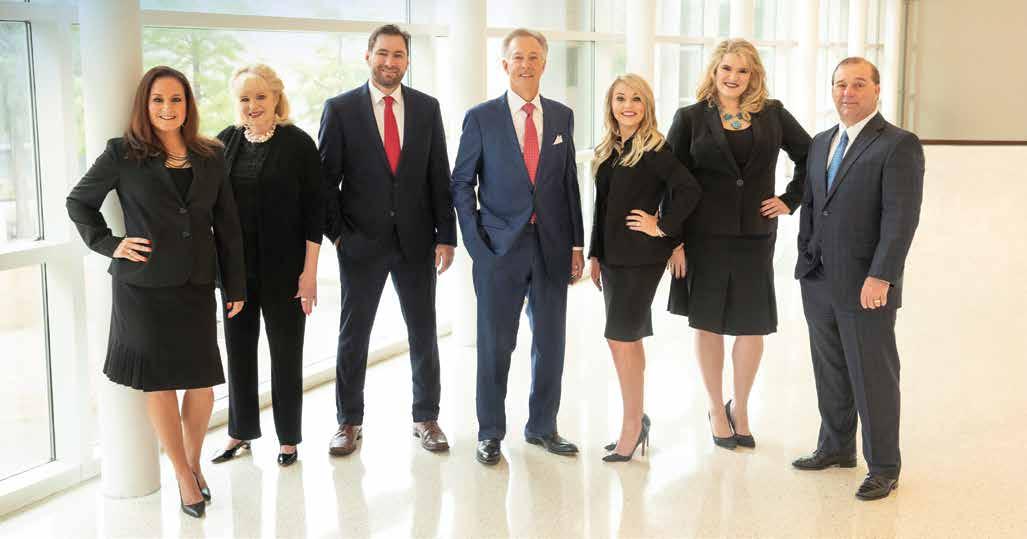
or guardianship proceeding that is pending in the statutory probate court.
Definition
A cause of action related to a probate or guardianship proceeding includes probating a will, construing the terms of a will, modify ing a will, or the granting of letters of guard ianship. It also includes an action brought against the personal representative of an estate or a guardian in their representative capacity, a claim brought by the personal representative or guardian in their representative capacity against someone else, and an action for the right of property (real or per sonal) that belongs to the estate. However, when the other matter involves a personal injury, death, or property damage claim, venue is determined by Section 15.007 of the CPRC, meaning the statutory probate court cannot transfer those types of lawsuits to itself.
Caselaw Examples
One example of the exercise of this power involved a Tarrant County statu tory probate court that transferred to itself a declaratory judgment action that was pend ing in a district court in Hartley County. A guardianship was pending in the Tarrant County probate court. A trustee of a trust, of which the ward was the beneficiary, filed a declaratory judgment action in a Hartley County district court seeking a declaration that the trust agreement and various trans fers from the ward to the trustee were valid. The trustee argued the mandatory venue for the declaratory judgment action was in Hartley County because: 1) the suit involved an interest in real property or title to real property, and 2) for suits involving a trust in
which there is a single noncorporate trustee, the Trust Code fixes venue in the county in which the trustee’s residence is located.
The Appellate Court found that if the “conditions authorizing the judge of a statutory probate court to transfer a cause of action to his court are met, then the judge has the authority to transfer the case notwithstand ing mandatory venue provisions and the like.” The court went on to state that the purpose of the ability to transfer cases is for efficiency and to promote judicial economy.
In another case out of Bexar County, a brother sued his sister on behalf of their father’s estate claiming the sister, acting under a power of attorney, had mismanaged the fathers real and personal property. The brother filed the case in an El Paso County district court. The sister requested the matter be transferred to the statutory probate court in Bexar County where settlement of the estate was pending. The statutory probate
court judge granted the motion and trans ferred the matter to its court. The court rea soned that the matter involved a claim for damages that would affect the value of the estate and involved a claim by a purported representative of the estate in their capacity as representative of the estate, which satisfies the requirements of section 34.001.

While statutory probate court judges may transfer other cases to their court, it is not mandatory. Statutory probate judges have the discretion to either grant or deny the motion to transfer.
The Reach Out and Pluck Statute can be a valuable tool to litigators who seek to move a case out of a less favorable court or a less desirable venue, provided the requirements of the Texas Estates Code sections 34.001 or 1022.007 are met. HN
Joseph E. Legere is an Attorney at Staubus & Randall, L.L.P. and can be reached at jel@srllp.com.
December 2022 Dallas Bar Association l Headnotes 37
Focus
Trusts & Estates/Tax
Welcome To Our World Staubus & Randall, L.L.P. is a Texas estate litigation firm. The attorneys at Staubus & Randall, L.L.P. are experienced trial lawyers. Our attorneys are some of the most active Probate, Trust and Guardianship litigators in probate courts across Texas. We offer big firm benefits in a boutique atmosphere. 8401 N Central Expressway Suite 210, Dallas, TX 75225 214-691-3411 www.srllp.com WILL CONTESTS | TRUST LITIGATION | GUARDIANSHIPS | FIDUCIARY LITIGATION Julie Blankenship / Diane Walker / Joseph Legere / P. Keith Staubus / Sadie Randall / Kelly Walker / Ryan Randall Decades of specialized knowledge and experience in Estate Litigation N E W L E G A C Y C L U B F O R E M E R I T U S M E M B E R S All Emeritus members (licensed 50+ years) are invited to make an optional $100 gift to support the DBA and its programs In addition to a free Emeritus membership, Legacy Club members receive special recognition in Headnotes, on the DBA website, and at the Annual Meeting E m e r i t u s M e m b e r s s h o u l d r e c e i v e t h e i r 2 0 2 3 r e n e w a l s t a t e m e n t s b y m a i l a r o u n d O c t o b e r 1
The Reach out and Pluck Statute
Probate,
Law
KUDOS
Quentin Brogdon, of Crain Brogdon, has been selected “Lawyer of the Year” for Plaintiffs Personal Injury Litigation in Dallas/Fort Worth for 2023 by Best Law yers of America
Carrie Huff, of Haynes and Boone, LLP, has been elected to serve a two-year term as chair of The Dallas Winds Symphony’s Board of Trustees.
Randy Johnston, of Johnston Tobey Baruch, P.C., was inducted into the Pampa HS Harvester Hall of Fame.
ON THE MOVE
Lacy Durham has joined Constella tion Energy in Houston.
Lauren Osterman has joined White & Starling PLLC.
Ruth Mitchell has joined Ashton Woods.
Gregory Wilhelm has joined Cantey Hanger L.L.P. as the Partner in Charge of the Midlothian Office.
Steve Bolden II has joined Locke Lord as Partner.
Britta Stanton has rejoined Lynn Pinker Hurst & Schwegmann as Part ner.
Caylin Craig has joined Crowe & Dunlevy as Associate.
Viking Tao has joined Polisnelli as Shareholder.
Kim Kerns has joined Spencer Fane’s Plano office as Of Counsel.
Paula Reichenstein and Craig Simon have joined Meadows, Collier, Reed, Cousins, Crouch & Ungerman LLP as Senior Counsel and Partner, respectively.
Alan Loewinsohn and Kerry Schon wald have joined McKool Smith as Principals.
Mary Snapp and Nate Wilkins have joined McGuire, Craddock & Strother as Associates.
Alise Abel has joined Ogletree, Dea kins, Nash, Smoak & Stewart, P.C. as Client Team Counsel.
Andrea Cook has joined Stewart Law Group PLLC as Partner.

Jervonne Newsome has joined Win ston & Strawn LLP as Partner.
Joshua Sandler has joined Winstead PC as Shareholder.


Dennis D. Conder has opened the firm Conder Mediation located at 12222 Merit Drive, Suite 1200, Dallas, Texas 75251. (469) 928-6234.
News items regarding current members of the Dallas Bar Association are included in Headnotes as space permits. Please send your announcements to Judi Smalling at jsmalling@dallasbar.org

38 Headnotes l Dallas Bar Association December 2022
In The News Save Date the Saturday, February 11, 2023 DBA Inaugural honoring 2023 President Cheryl Camin Murray Westin Galleria Dallas Hotel Website coming soon d DBA WE LEAD WOMEN EMPOWERED TO LEAD APPLY NOW! DBA WE LEAD (Women Empowered to Lead in the Legal Profession) is a leadership program designed to address the challenges of high-performing women who have practiced law for 8 to 15 years. WHO DBA WE LEAD is accepting applications from women lawyers who graduated from law school between 2007 and 2014, have established themselves in their careers and communities, and want to further explore advancement opportunities and leadership skills. WHEN DBA WE LEAD runs from February 2023 to November 2023 and includes four half-day sessions with mandatory attendance. Cost: $1,000 Application Deadline: December 1, 2022 Need-based scholarships are available For information and online application visit: www.tinyurl.com/2023DBAWELEAD Questions? Contact Judi Smalling at jsmalling@dallasbar.org. When you cannot help a prospective client, remember... • Qualified panel of lawyers in all areas of practice and most areas of town. • $20 fee to the client for a 30-minute consultation with a lawyer. • All lawyers carry professional malpractice insurance. TH E DBA L A WYER REFERRAL S ER VICE! (214) 220-7444 | w www.dallasbar.org/lawyerreferralservice
BY CHRISTINE ROBINSON
With a new corporate book minimum tax, an excise tax for public corporation stock buybacks, and a slate of clean energy tax credits, the Inflation Reduction Act of 2022 (IRA) enacted in August is a grab bag of rev enue-raisers and business tax incentives that become effective on New Year’s Day. The IRA also gave a big cash infusion to the IRS. Lawyers can help their business clients by understanding these new federal tax changes and keeping them in front of mind when planning transactions in 2023 and thereafter.
The Corporate AMT is Back –With a Twist
The corporate alternative minimum tax was first introduced in the Tax Reform Act of 1986. It required corporations to calculate their income tax liability twice, once using the tax code and once using an alternative calculation based on removing various tax preferences, and pay whichever tax was larger. The corporate AMT under went a variety of modifications over the years until its repeal by the Tax Cuts and Jobs Act of 2017 (TCJA).
The IRA revives the corporate AMT for tax years beginning after 2022, in the form of a 15 percent minimum book tax on the adjusted financial statement income or AFSI (rather than on an alternative minimum tax able income) of any corporation (not includ ing S-corporations, RICs, or REITs) that has an average annual AFSI over $1 billion over the preceding three years. Foreign-parented companies would also be subject to the $1 billion threshold so long as their U.S.-con nected income exceeds $100 million. Given the looming effective date, Treasury and the
IRS will need to turn on the afterburners to write regulations implementing the complex new tax that is expected to raise $222 billion over 10 years.
Public Stock Buyback 1% Excise Tax
The new one-percent stock buyback excise tax applies to publicly traded stock repurchases made after December 31, 2022. There are exceptions to the buyback tax for a variety of stock repurchases: those occur ring in connection with tax-free reorganizations; in amounts of $1 million or less; made by a RIC or REIT; where the repurchased stock is contributed to employer-sponsored retirement plans, employee stock owner ship plans, or similar plans; those that are treated like dividends; or repurchases made by securities dealers in the ordinary course of business. While federal excise taxes are normally deductible business expenses, this one is expressly non- deductible. The Joint Committee on Taxation estimates the new excise tax will raise $74 billion over 10 years.
Another Excess Business Loss Limitation Extension



The excess business loss limitation in Internal Revenue Code Section 461(l), enacted in the TCJA, works by disallow ing individual taxpayers’ ability to deduct “excessive” pass-through business losses (over $250,000 for individual returns and over $500,000 for joint returns) against non-business income such as wages, inter est, and dividends. Although Section 461(l) was originally planned to be opera tional during the 2018-2025 timeframe like

many other TCJA provisions, Congress has flipped the EBL limitation on and off like a light switch during the pandemic era. The CARES Act of 2020 delayed the EBL start date until 2021. The American Rescue Plan Act of 2021 then extended the EBL limitation’s ending date to 2026. The IRA’s further two-year extension of the EBL limi tation until 2028 is expected to be a $53 billion revenue-raiser over 10 years.
It Pays to Go Green
The IRA is the largest federal investment in clean energy in U.S. history and contains numerous tax credits and incentives provid ing an estimated $370 billion in new energyrelated tax credits over the next 10 years. The IRA creates two new ways to monetize renewable energy credits: a direct pay elec tion for tax-exempt taxpayers and a credit transfer mechanism allowing taxpayers to sell the credits to unrelated parties for cash.
There’s a New Sheriff in Town
The IRA boosts the IRS’s tax enforce ment funding by $80 billion, which in turn is
projected to increase federal tax receipts by $204 billion over 10 years. “During the next 10 years, these funds will help us in many areas, including adding critical resources to not just close the tax gap, but meaningfully improve taxpayer service and technology,” IRS Commissioner Charles Rettig said in a statement. Treasury Secretary Janet Yellen has directed the IRS not to use any of the new IRA funding to increase the chances of audit for Americans making less than $400,000 a year. Congressional GOP lead ers have threatened to undo the funding.
Not Making the IRA Cut
Notable proposed tax changes NOT included in the IRA: no increase in the cor porate income tax rate (still 21 percent); no changes to the tax treatment of carried interests; no changes to the SALT deduction (still capped at $10,000); no extension of the pending phaseout of 100-percent bonus depreciation; and no change to stepped-up basis at death. HN
Christine Robinson teaches federal income tax courses at Baylor Law School. She can be reached at christine_robinson@baylor.edu.
December 2022 Dallas Bar Association l Headnotes 39
Ringing in the New Year with Business Tax Changes Focus Probate, Trusts & Estates/Tax Law Classif Ads Availa Onlin O f f i c e S p a c e , P o s i t P o s i t i o n s A v a i l a b l e , S e r v i c e s C o n t a c t J u d i S m a l l i n g j s m a l l i n g @ d a l l a s b a r o r g 2 1 4 2 2 0 7 4 5 2
Rob Crain
Rcrain@crainbrogdon.com
Quentin Brogdon Qbrogdon@crainbrogdon.com
John J. Spillane Jspillane@crainbrogdon.com

4925 Greenville Ave | Suite 1450 Dallas, TX 75206
HOPE & PEACE WISHING YOU A SEASON OF
Office: 214.522.9404 Fax: 214.613.5101 crainbrogdon.com H y Hol s











































 BY TANNER HARTNETT
BY TANNER HARTNETT






























































































 BY GINO ROSSINI
BY GINO ROSSINI




























